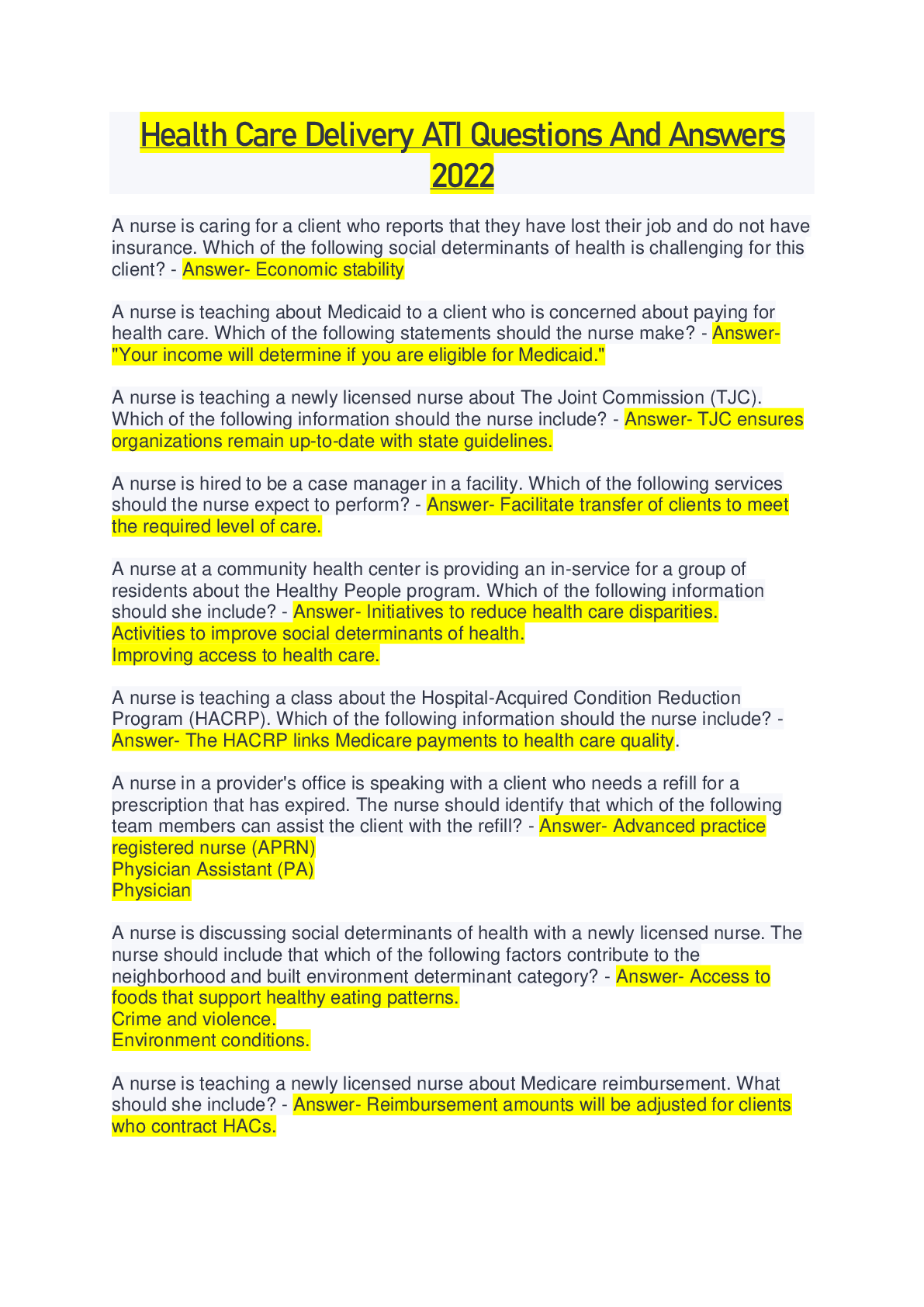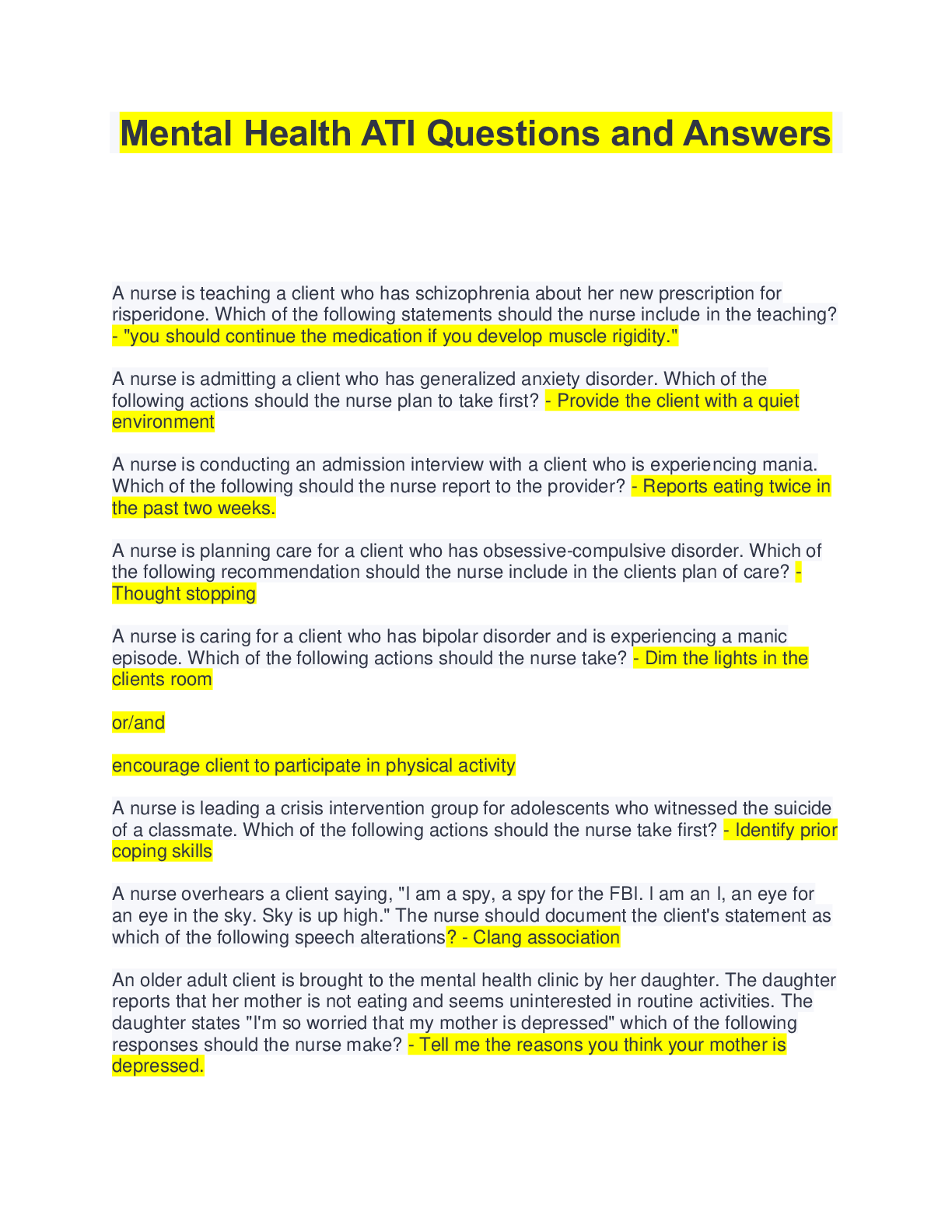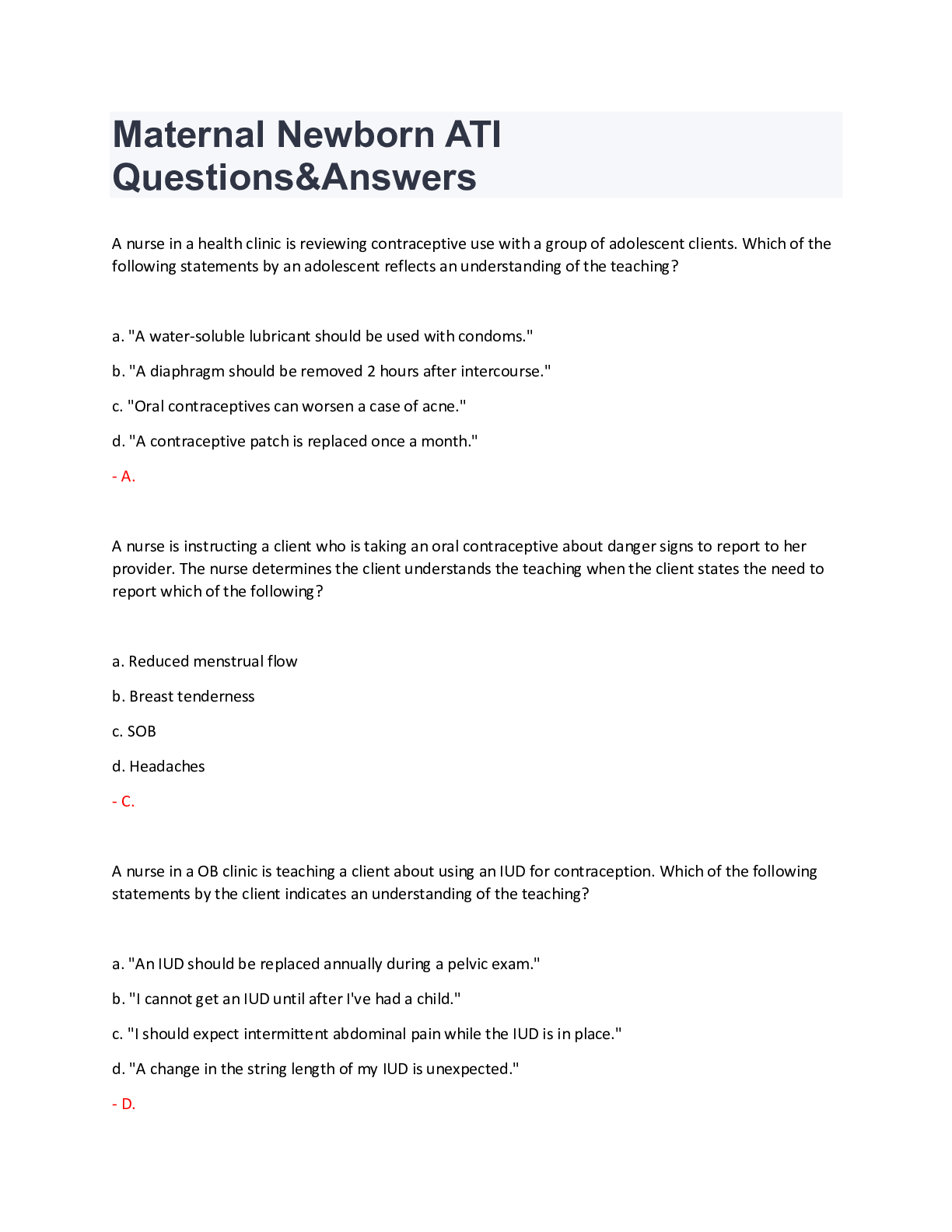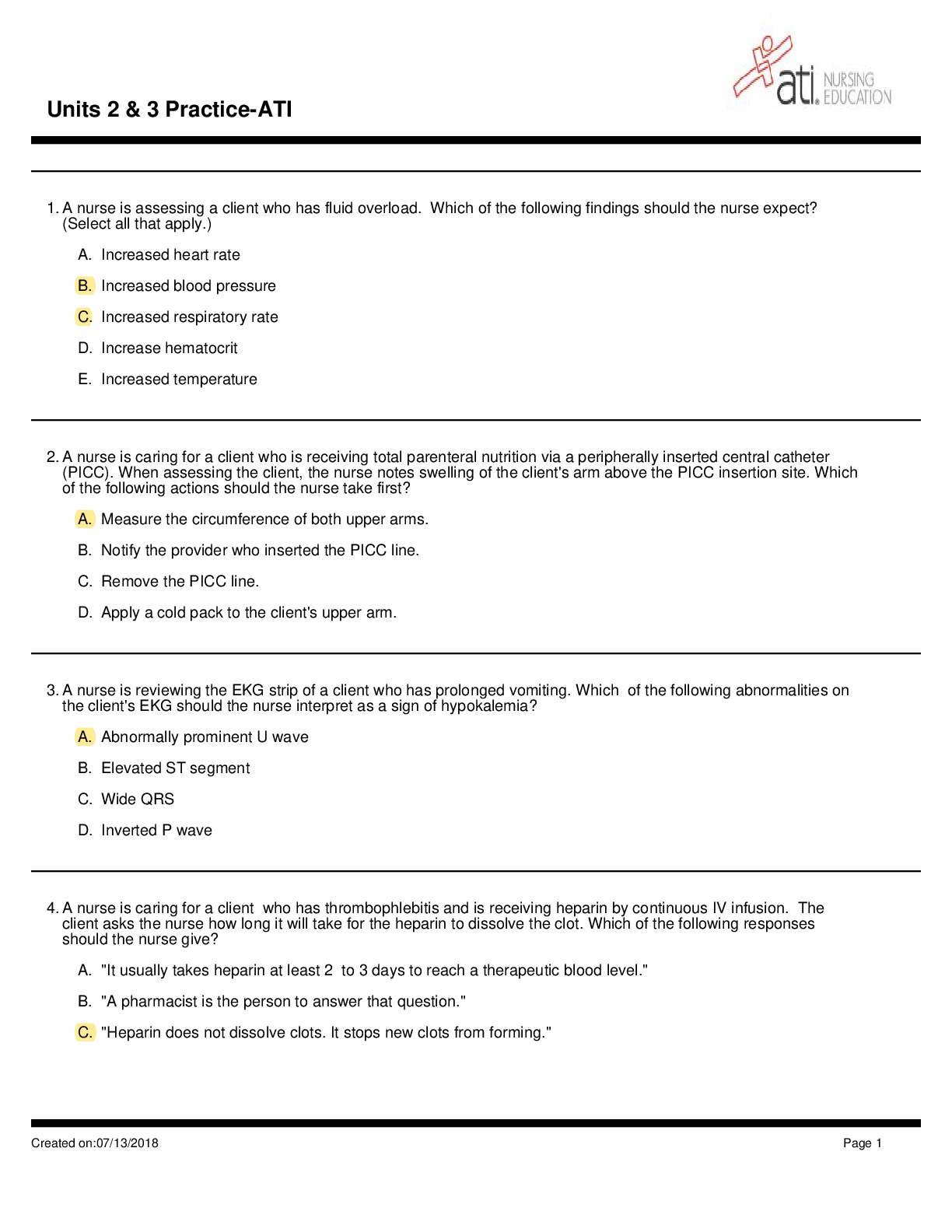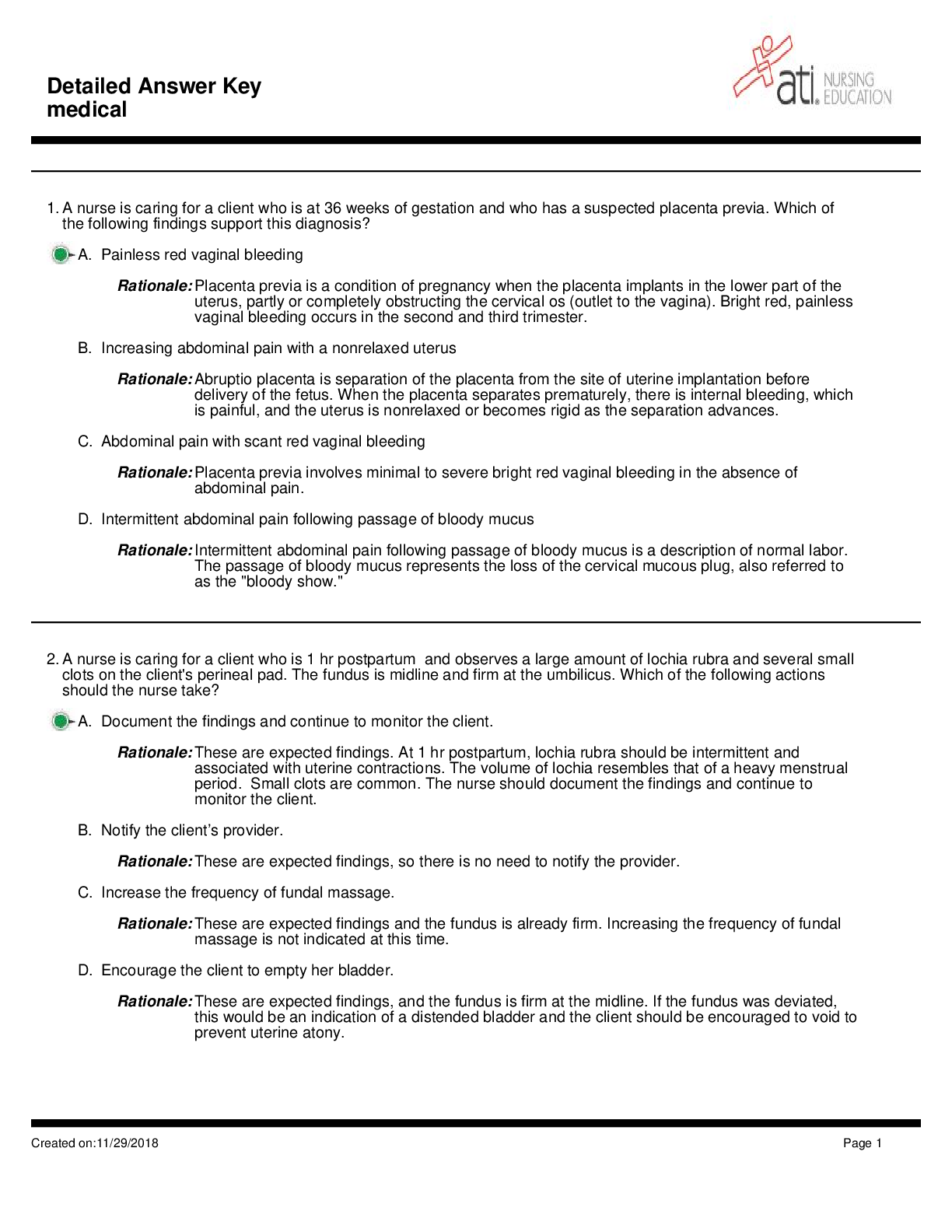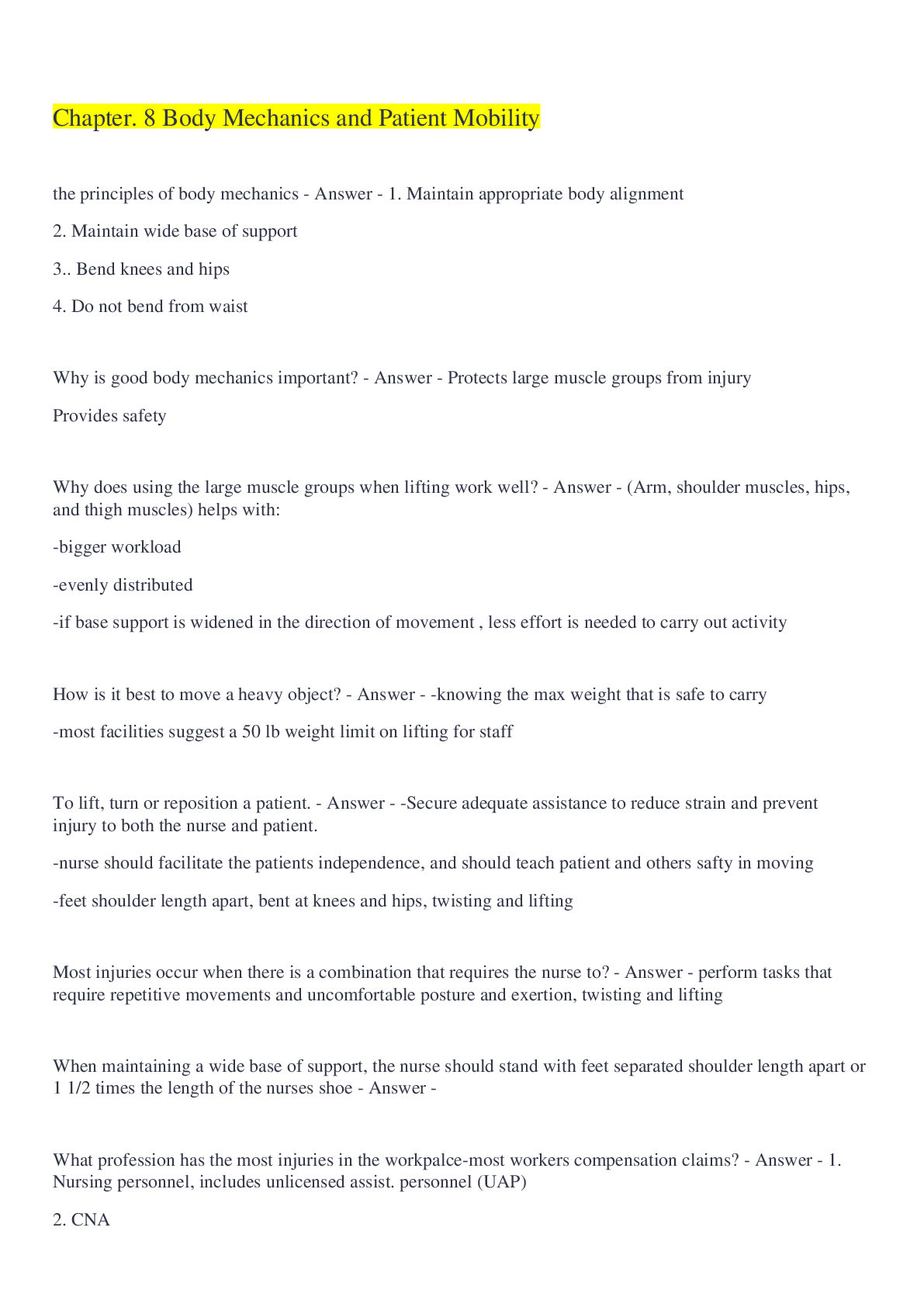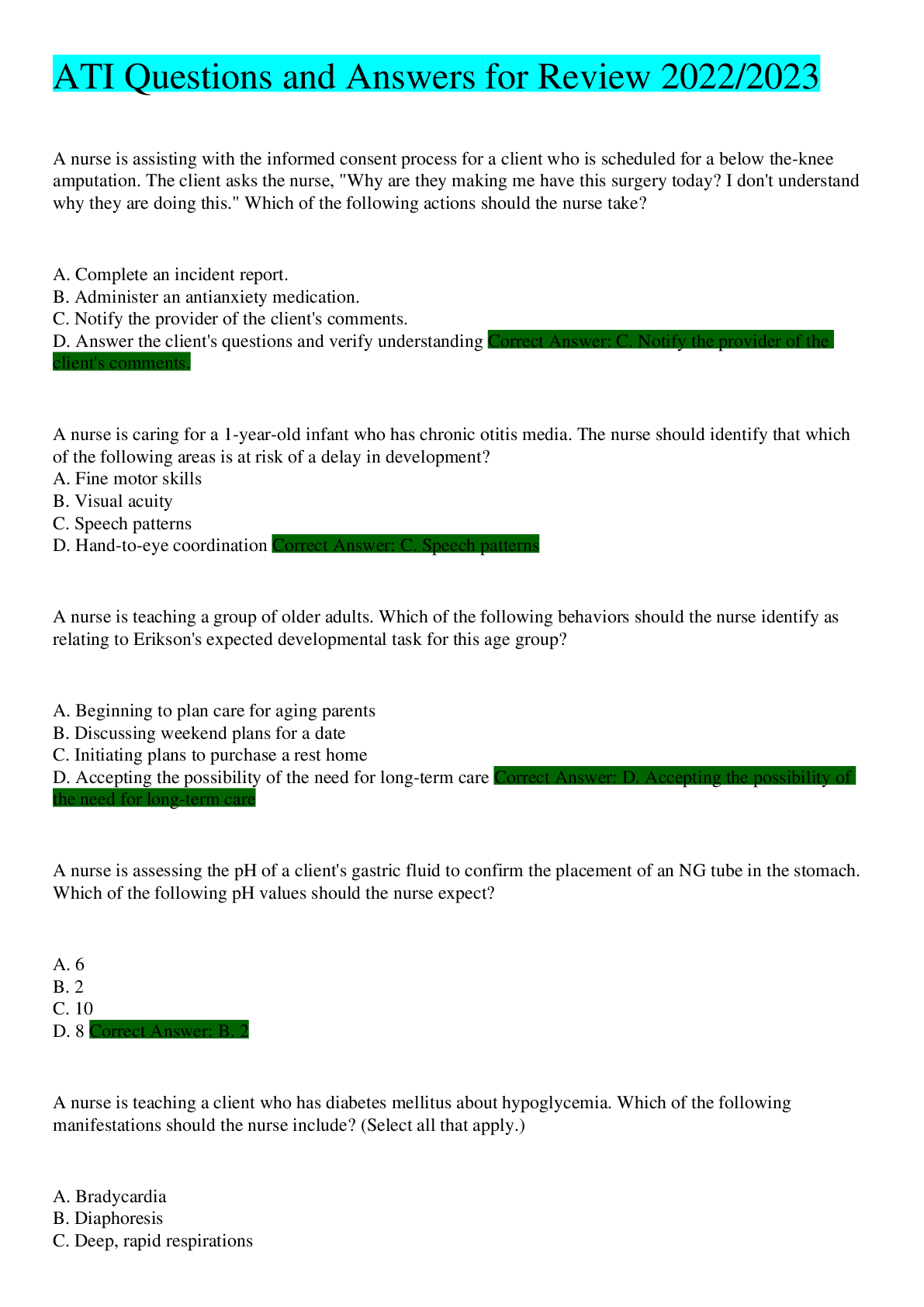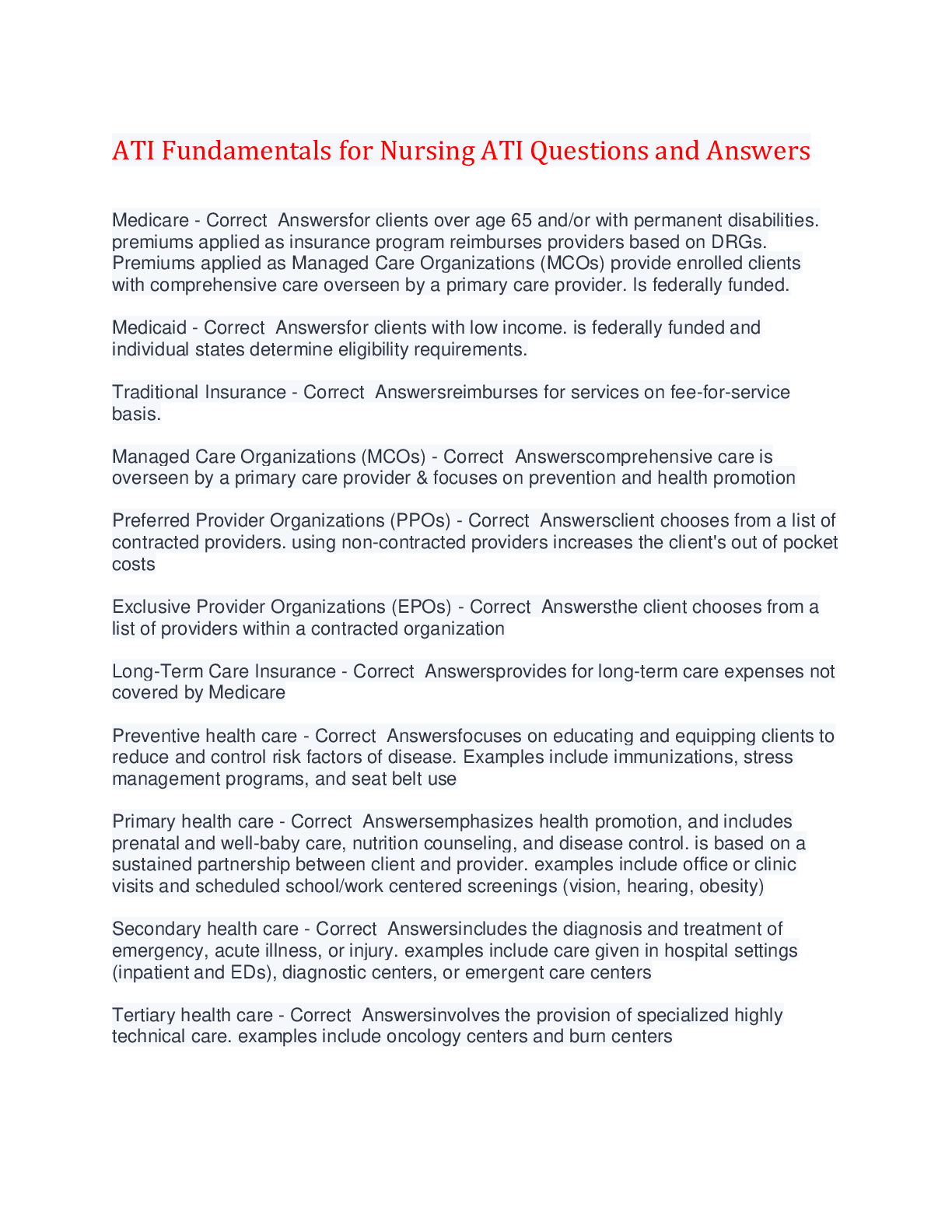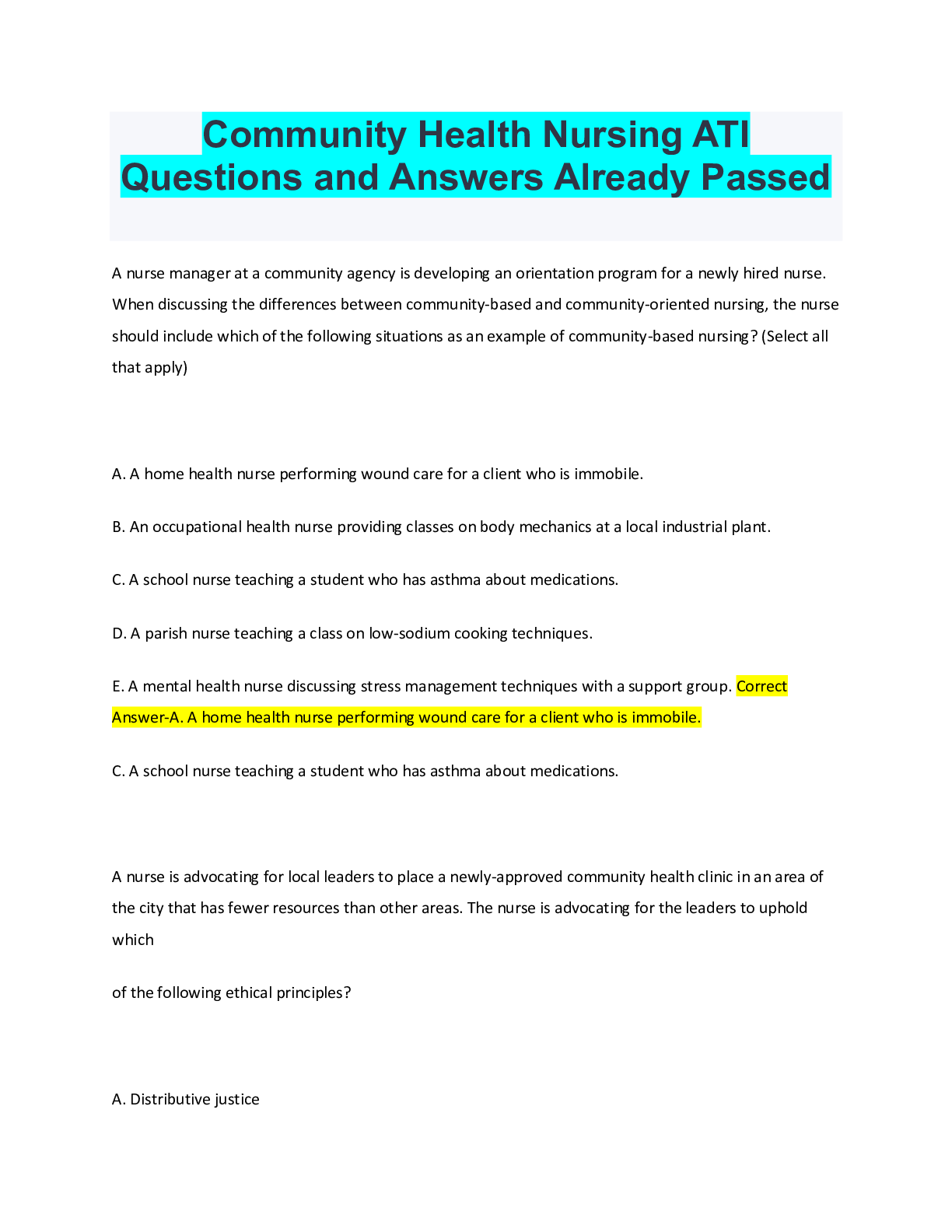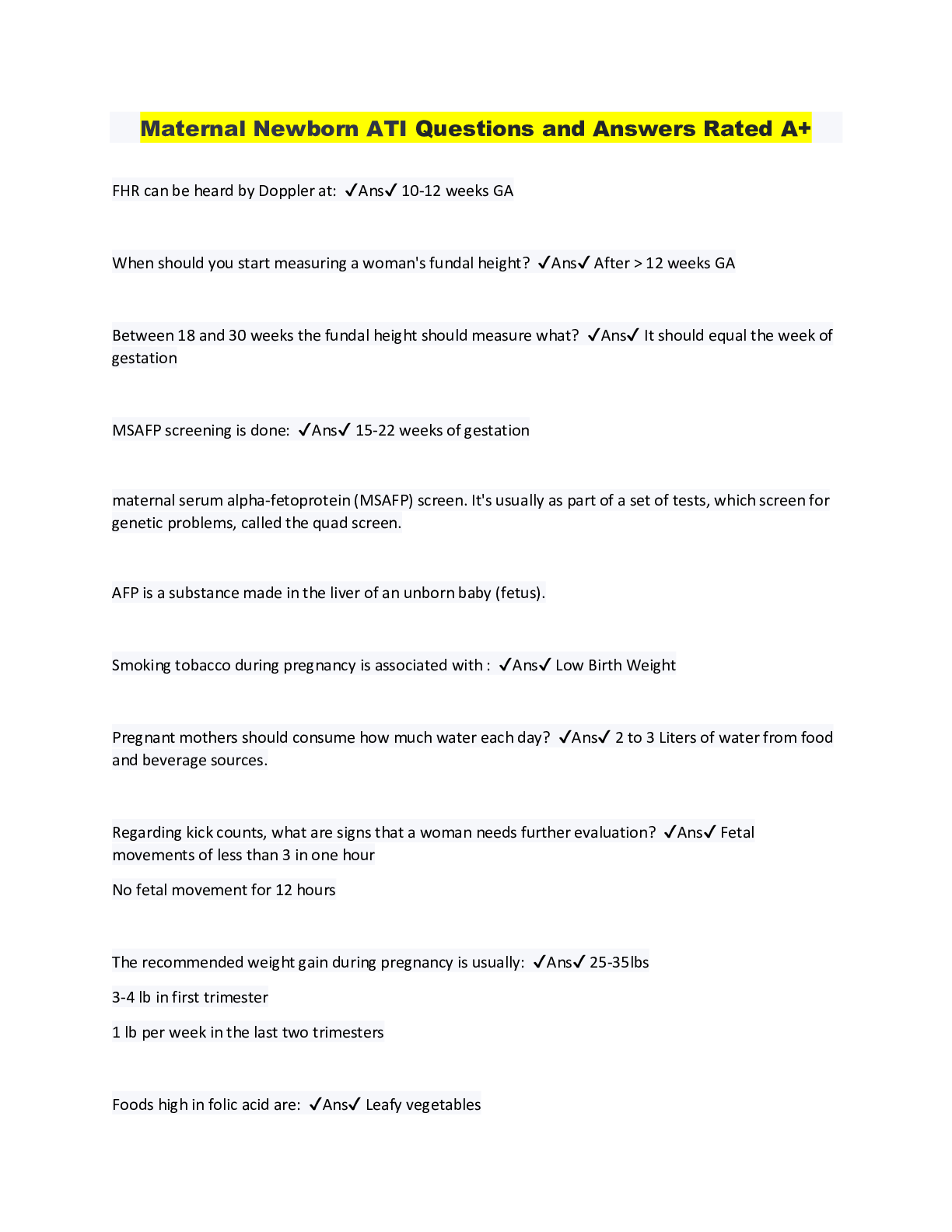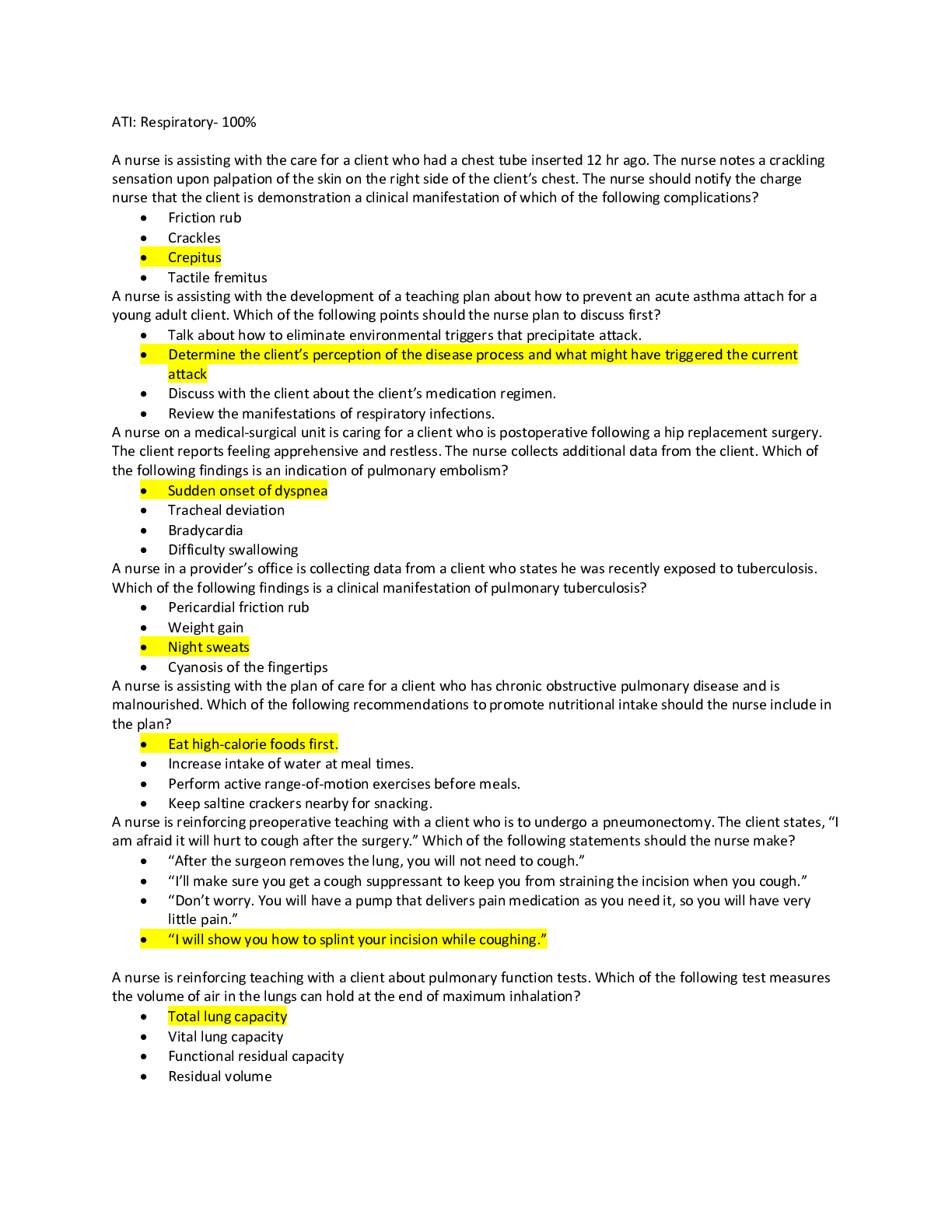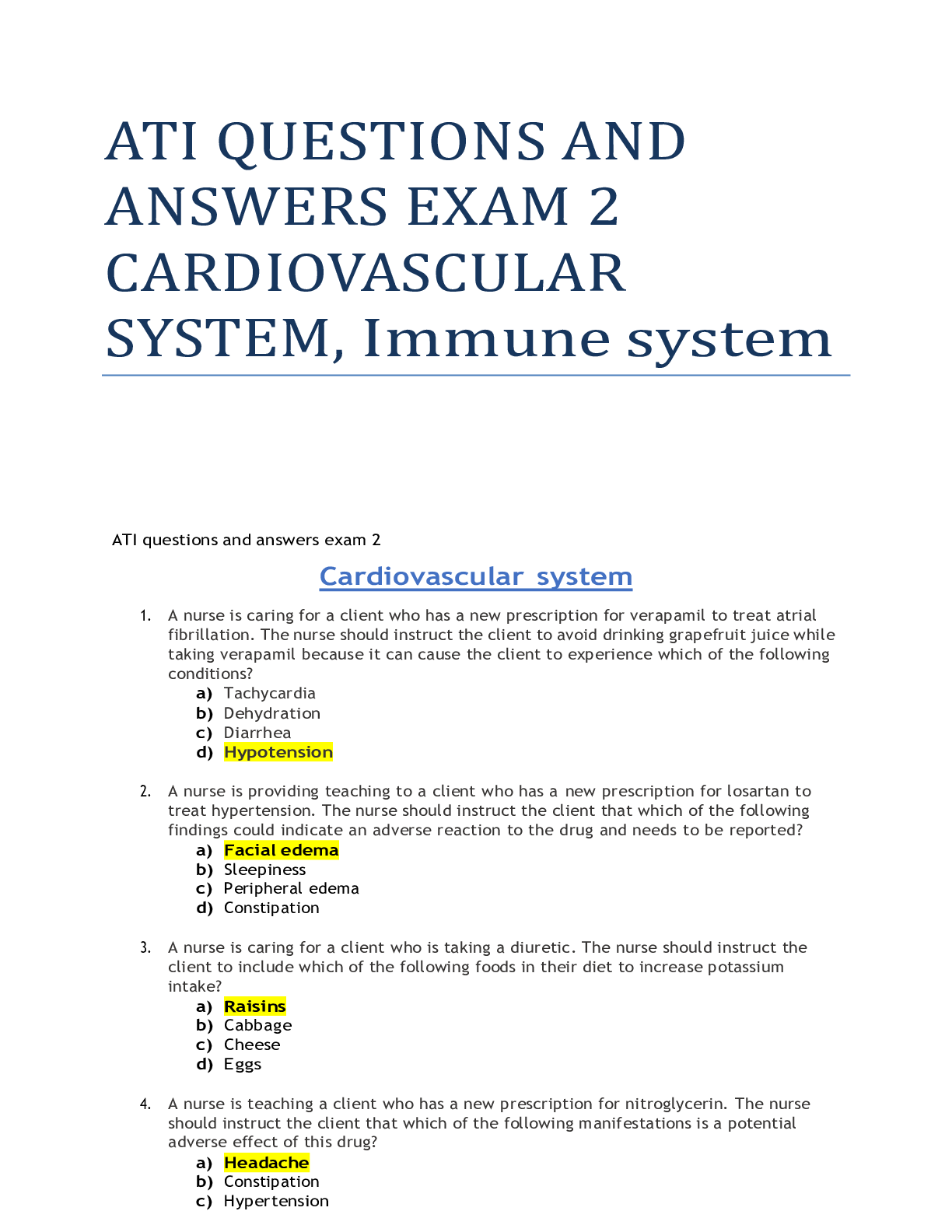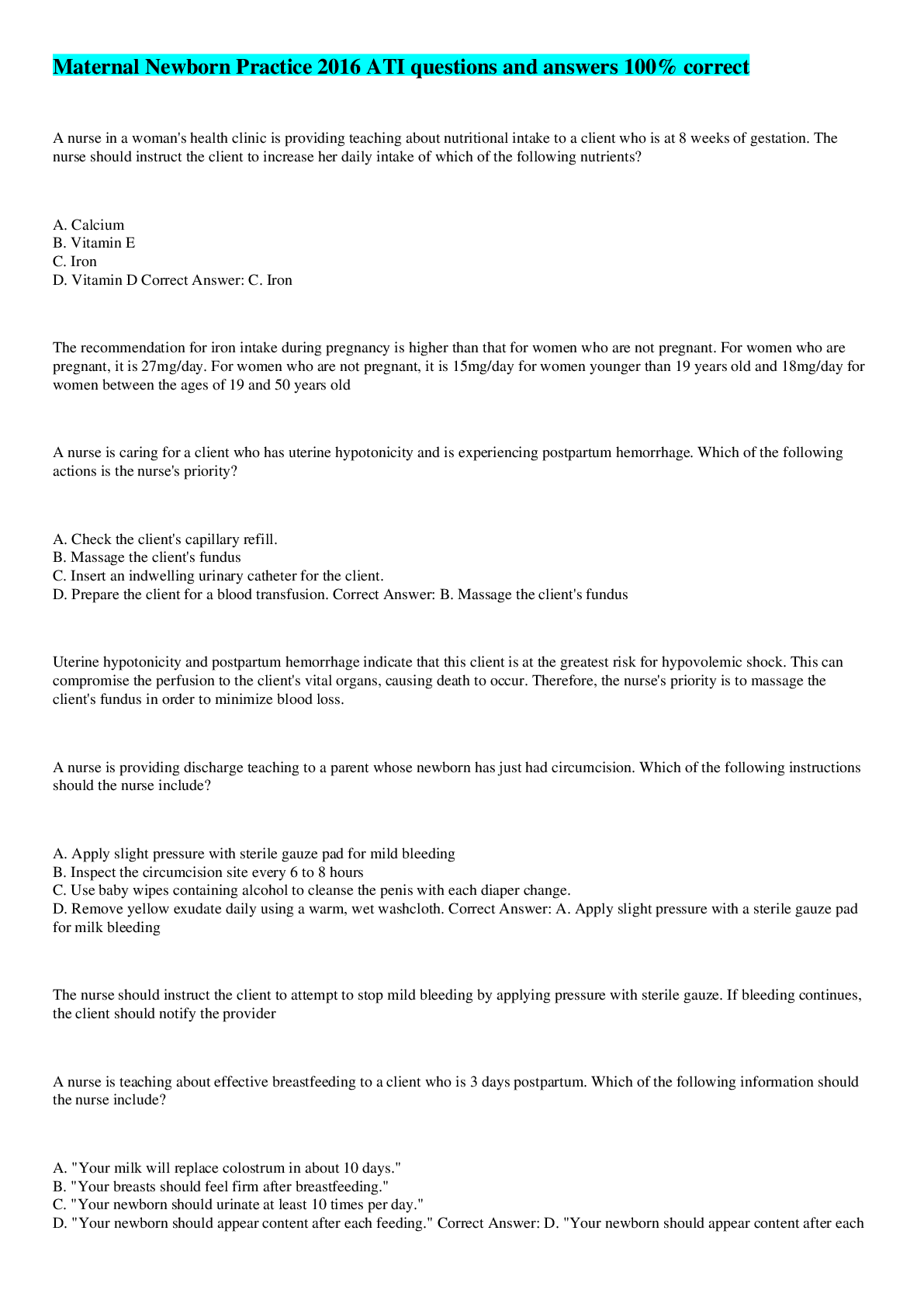PED 240 ATI Questions and Answers,100% CORRECT
Document Content and Description Below
PED 240 ATI Questions and Answers 1. A nurse is providing education about dietary modifications to the parents of a school-age child who has glomerulonephritis. Which of the following information sho... uld the nurse include in the teaching? a. Increase the child’s calcium intake b. Decrease the child’s sodium intake. c. Increase the child’s intake of carbohydrates. d. Decrease the child’s fat intake. 2. A nurse is providing teaching to the parents of a school-age child newly diagnosed with a seizure disorder. The nurse should teach the parents to take which of the following actions during a seizure? a. Minimize movement of the limbs b. Insert a tongue blade between the teeth c. Clear the area of hard objects d. Place the child in a prone position. 3. A nurse is assessing an adolescent who has type 1 diabetes mellitus. Which of the following findings is the nurse’s priority? a. HbA1c 11.5% b. Cholesterol 189mg/dL c. Preprandial blood glucose 124 mg/dL d. Glycosuria 4. A nurse is providing anticipatory guidance to a parent of a 1-month-old infant. The nurse should include that it is recommended to start the series of which of the following immunization first? a. Varicella b. Measles, mumps, and rubella c. Inactive poliovirus d. Hepatitis A 5. A nurse is reviewing the laboratory report of a toddler who has hemolytic uremic syndrome. Which of the following findings should the nurse expect? a. Creatinine 0.3 mg/dL b. Hgb 18 g/dL c. Urine Casts absent d. BUN 28 mg/dL 6. A nurse is caring for a school-age-child who is experiencing a sickle cell crisis. Which of the following action should the nurse take? a. Administer furosemide IV twice per day. b. Apply warm compresses to the affected areas. c. Decrease the child’s fluid intake. d. Initiate contact precautions. 7. A nurse is assessing a 6-month-old infant who has respiratory syncytial virus. The nurse should immediately report which of the following findings to the provider? a. Rhinorrhea b. Tachypnea c. Pharyngitis d. Coughing 8. A nurse is planning to teach an adolescent who is lactose intolerant about dietary guidelines. Which of the following instructions should the nurse include in the teaching? a. You can drink milk on an empty stomach. b. You should consume flavored yogurt instead of plain yogurt. c. You may tolerate plain milk better than chocolate milk. d. You can replace milk with nondairy sources of calcium. 9. A nurse on a pediatric intensive care unit is caring for a toddler who weighs 12 kg (26.5lb) and is postoperative following open-heart surgery. Which of the following findings should the nurse report to the provider? a. Skin temperature 36oC (96.8oF) b. Pedal and posterior tibia pulses of 2+ ??? c. Urine output of 15 mL in the last 2 hr d. Drainage from the chest tube of 22 mL in the last hour 10. A nurse is providing dietary teaching to a parent of a 10-month-old infant who has phenylketonuria. Which of the following responses by the parent indicates an understanding of the teaching? a. My daughter can’t drink orange juice. b. I will steam carrots and cut them into small pieces for her. c. I should ensure that my daughter eats 1 ounce of meat every day. d. I will switch her to whole milk now that she’s old enough. 11. A nurse is providing teaching to the parents of a preschool-age child who has celiac disease. Which of the following instructions should the nurse include? a. Your child will be on a gluten-free diet for the rest of her life. b. Your child will need to follow a low-protein diet temporarily. c. You should place your child on a high-fiber diet when she has an exacerbation. d. You should replace white flour with wheat for your child. 12. A nurse is administering albuterol by metered dose inhaler for a preschool-age child who is experiencing an asthma exacerbation. Which of the following findings should the nurse report to the provider? a. Respiratory rate 24/min b. Peak flow rate of 80% c. Intercostal retractions d. Elevated heart rate 13. A nurse is caring for a school-age child who is 1hr postoperative following a tonsillectomy. Which of the following actions should the nurse take? (Select all that apply.) a. Administer an analgesic to the child on a scheduled basis b. Observe the child for frequent swallowing c. Provide cranberry juice to the child d. Maintain the child in a supine position. e. Discourage the child form coughing. 14. A nurse is caring for a school-age child who has heart failure. Which of the following findings should the nurse expect? (Select all that apply) a. Tachycardia b. Weight loss c. Cyanosis d. Dyspnea e. Bounding peripheral pulses 15. A nurse in an emergency department is assessing a toddler who has a head injury. Which of the following findings should the nurse report to the provider? a. Glasgow Coma Scale score of 15 b. Respiratory rate 25/min c. Vomiting d. Negative Babinski reflex 16. A nurse is caring for a toddler who is in the terminal stage of neuroblastoma. The parents ask, “How can we help our child now?” Which of the following responses by the nurse is appropriate? a. “Talk to your child about the meaning of death.” b. “Encourage your child’s friends to visit”. c. “Stay close to your child.” d. “Change your child’s schedule every day.” 17. A nurse is preparing to administer cephalexin 25 mg/kg PO to a child who has otitis media and weighs 22 kg (48.5lb). Available is cephalexin solution 250 mg/5mL. How many mL should the nurse administer? (Round to the nearest whole number. Use a leading zero if it applies. Do not use a trailing zero.) 11 mL 25 X 22=550 mg 250x=2,750 X=2,750 /250=11 18. During a well-baby visit, the parent of a 2-week-old newborn tells the nurse, “My baby always keeps her head tilted to the right side.” The nurse should further assess which of the following areas? a. Sternocleidomastoid muscle b. Posterior Fontanel c. Trapezius muscle d. Cervical vertebrae 19. A nurse is caring for a single mother of a 6-month-old infant. During a well-baby visit, the mother expresses feeling “inexperienced” in caring for the baby. The nurse should recommend which of the following community resources? a. Respite child care b. Parent management training c. Support group for postpartum depression d. Parent enhancement center 20. A nurse is admitting an infant who has GERD. Which of the following is the priority assessment finding? a. Regurgitation b. Wheezing c. Excessive Crying d. Weight loss 21. A nurse is caring for an infant who has severe dehydration. Which of the following clinical findings should the nurse expect? a. Capillary refill 3 seconds b. Rapid respirations c. Bradycardia d. Warm extremities 22. A nurse is teaching a group of female adolescents about healthy eating. Which of the following instructions should the nurse include in the teaching? a. “Consume 1,500 to 1,700 calories per day” b. “Decrease your vitamin D intake once you start to menstruate.” c. “Increase the amount of your dietary iron intake.” d. “Limit your sodium intake to 3, 000 milligrams per day 23. A nurse is preparing to administer immunizations to a 3-month-old infant. Which of the following is an appropriate action for the nurse to take to deliver atraumatic care? a. Provide a pacifier coated with oral sucrose solution prior to the injections. b. Inject the immunizations into the deltoid muscle. c. Apply eutectic mixture or local anesthetics (EMLA) cream immediately before the injections. d. Use a 20-gauge needle for the injections. 24. A nurse is caring for a child who has impetigo contagiosa that developed in the hospital. Which of the following actions should the nurse take? a. Report the disease to the state health department. b. Administer amphotericin B IV. c. Initiate contact isolation precautions. d. Apply lidocaine ointment topically. 25. A nurse is providing discharge teaching to the parents of a school-age child who has cystic fibrosis. Which of the following responses by the parents indicates an understanding of the teaching? a. “I will limit my child’s daily fluid intake.” b. “I will restrict the amount of sodium in my child’s diet c. “I will give my child pancreatic enzymes with snacks and meals.” d. “I will prepare low-gat meals with limited protein for my child.” 26. A nurse is caring for a 4-year-old child who has meningitis and is receiving gentamicin. Which of the following laboratory values should the nurse report to the provider? a. Creatinine 1.4 mg/dL b. Creatinine 0.3 mg/dL c. BUN 6 mg/dL d. BUN 12 mg/dL 27. A nurse is providing teaching to the parents of a school-age child who has ADHD and a new prescription for methylphenidate. The nurse should explain that this medication will have which of the following therapeutic effects? a. Promoting rest b. Improving appetite c. Reducing anxiety d. Increasing focus 28. A nurse is teaching an adolescent how to manage his cystic fibrosis. Which of the following statements y the adolescent indicates an understanding of the teaching. a. “I will take fewer enzymes when I eat high-fat foods.” b. “I will be excused from physical education class.” c. “I will limit my calcium intake to prevent kidney stones.” d. “I will increase my intake of vitamin D.” 29. A nurse in a provider’s office is caring for a preschool-age child who might have acute epiglottitis. Which of the following actions should the nurse take? a. Examine the oral mucosa using a tongue depressor. b. Obtain a sterile throat culture. c. Provide humidified oxygen via nasal cannula. d. Allow the child to sit in a comfortable position. 30. A nurse is providing teaching to the parents of a child who has impetigo. Which of the following instructions should the nurse include in the teaching? a. Administer acyclovir PO two times per day. b. Soak hairbrushes in boiling water for 10 minutes c. Apply bactericidal ointment to lesions. d. Seal soft toys in a plastic bag for 14 days. 31. A nurse is preparing to perform a venipuncture to collect a blood sample from an infant. Which of the following restraints should the nurse plan to use for this procedure? a. Mummy b. Mitten c. Jacket d. Elbow 32. A nurse is reviewing the laboratory report of a school-age child who has rheumatic fever. Which of the following laboratory findings should the nurse expect? a. Decreased BUN b. Increased antistreptolysin o titer (ASO) c. Increased immunoglobulin G (IgG) d. Decreased erythrocyte sedimentation rate (ESR) 33. A nurse is administering an opioid to an adolescent who is in sickle cell crisis. Which statement is true regarding opioid pain management? a. Oral opioid doses should be larger than parenteral doses. b. Oral opioids should not be combined with other types of pain relievers. c. Opioid doses should be titrated until sedation occurs. d. Opioid doses should be used for mild pain. 34. A nurse is planning care for an adolescent following repair of Meckel diverticulum. Which of the following actions should the nurse include in the plan of care? a. Administer total parenteral nutrition b. Teach the client about ostomy care c. Initiate long-term antibiotic therapy. d. Maintain an NG tube for decompression 35. A nurse is preparing to perform peritoneal dialysis for a child who has an elevated serum creatinine level. After explaining the procedure, which of the following actions should the nurse plan to take? a. Initiate IV access. b. Keep the dialysate refrigerated until time of infusion c. Check the fistula site for a bruit. d. Obtain the child’s weight. 36. A nurse is caring for an adolescent who is 1 hr postoperative following an appendectomy. Which of the following findings should the nurse report to the provider? a. Muscle rigidity b. Heart rate 63/min c. Temperature 36.4oC (97.5oF) d. Abdominal pain 37. A nurse is caring for a preschool-age child who is postoperative following a tonsillectomy and is clearing her throat frequently. Which of the following actions should the nurse take first? a. Give the child small sips of water. b. Observe the child’s throat with a flashlight. c. Administer an analgesic d. Offer the child an ice collar 38. A nurse is planning care of r a toddler who has developed oral ulcers in response to chemotherapy. Which of the following actions should the nurse include in the plan of care? a. Cleanse the gums with saline soaked gauze.? b. Administer oral viscous lidocaine. c. Schedule routine oral care every 8 hr. d. Moisten the mucosa with lemon glycerin swabs. 39. A nurse is planning care for a child immediately following the insertion of a chest tube for continuous suction with a closed drainage system. Which of the following interventions should the nurse include in the plan of care? a. Change the chest tube insertion site dressing every 12 hr. b. Report the presence of tidaling of fluid in the water seal chamber. c. Ensure continuous bubbling is present in the suction control chamber. d. Record the amount of chest tube drainage every 2 hr. 40. A nurse is prioritizing care for four clients. Which of the following clients should the nurse assess first? a. An adolescent who is in skin traction and reports a pain level of 7 on a scale from 0 to 10 ??? b. An adolescent who has sickle cell anemia and slurred speech c. A toddler who has a new diagnosis of osteomyelitis and is to receive an IV bolus of nafcillin. d. A toddler who has a partial-thickness burn on his right hand and requires a dressing change. 41. A nurse is assessing an adolescent who has Crushing’s syndrome. Which of the following should the nurse expect? a. Cachectic appearance b. Blood glucose 320 mg/dL c. Potassium 4.2 mEq/L d. Advance bone age 42. A nurse is caring for a preschooler who has a brain tumor. Which of the following findings is the priority for the nurse to report to the provider? a. Nightmares b. Pruritus c. Diplopia d. Hyperactivity 43. A charge nurse is planning care for an infant who has failure to thrive. Which of the following actions should the nurse include in the plan of care? a. Give the infant fruit juice between feedings. b. Use half-strength formula when feeding the infant. c. Keep the infant in a visually stimulating environment d. Assign consistent nursing staff to the care for the infant. 44. A nurse is providing discharge teaching to the parents of an infant who is at risk for sudden infant death syndrome (SIDS). Which of the following statements by the parents indicates an understanding of the teaching? a. “I will move my baby’s stuffed animal to the corner of her crib while she sleeps.” b. “I will dress my baby in lightweight clothing to sleep.” c. “I will have my baby sleep next to me in bed during the night.” d. “I will lay my bay on her side to sleep for naps.” 45. A nurse is caring for a child who has acute glomerulonephritis. Which of the following finding should the nurse expect? a. Temperature 39oC (102.2oF) b. Periorbital edema c. Hypotension d. Positive urine culture 46. A nurse is assessing a 1-month-old infant at a well-child visit. Identify the location the nurse should stroke to elicit the rooting reflex. (You will find hot spots to select in the artwork below. Select only the hot spot that corresponds to your answer.) Check the CHEEK 47. A nurse is providing postoperative care for a child following an arterial cardiac catheterization. Which of the following actions should the nurse take? a. Keep the affected extremity straight for at least 6 hrs. b. Monitor output using an indwelling urinary catheter for the first 24 hr. c. Remove the child’s pressure dressing after the first 4 hrs. d. Maintain the child’s NPO status for 4 to 6hr 48. A nurse in a provider’s office is providing teaching to the parents of preschooler who has Down syndrome. Which of the following statements by one of the parent indicates an understanding of the instructions? a. We’ll have soft music playing in the background when we teach our son a new skill. b. We’ll explain that it’s best for our son to wait until kindergarten to start going to school. c. We’ll be sure to demonstrate a new skill before expecting our son to perform it. d. We’ll focus on our son understanding the principles of skill rather than mastering it. 49. A nurse is teaching a parent of a 10-month-old infant about home safety. Which of the following instructions should the nurse include in the teaching? (Select all that apply) a. Remove labels form containers that contain toxic substances. b. Select a toy chest that has a heavy, hinged lid. c. Place gates at the top and bottom of the stairs. d. Keep toilet lids in the upright position. e. Ensure the crib mattress is in the lowest position. 50. A nurse is providing discharge teaching to a parent of a toddler who has a ventriculoperitoneal shunt. Which of the following statement by the parent indicates an understanding of the teaching? a. My child will need to take prophylactic antibiotics daily until the shunt is removed.” b. I should call my doctor if my child begins vomiting. c. I should pump the shunt at the same time each day. d. I should check my child’s heart rate before administering medications. 51. A nurse in a provider’s office is assessing the vital signs of a 2-year old child at a well-child visit. Which of the following findings should the nurse report to the provider? a. Temperature 37.2oC (99oF) b. Respiratory rate 26/min c. Blood pressure 118/74 mm Hg d. Pulse rate 98/min 52. A nurse is assessing a 3-month-old infant who has diarrhea. Which of the following findings should the nurse expect? a. Bulging Fontanel b. Decreased heart rate c. Polyuria d. Increased hematocrit 53. A nurse is preparing to administer imipenem/cilastatin 25 mg/kg to a child who weights 77 lb. How many mg should the nurse plan to administer? (Round the answer to the nearest whole number. Use a leading zero if it applies. Do not use a trailing zero.) 875 mg 77/2.2= 35 Kg 25mg X 35=875 mg 54. A nurse is providing teaching to a parent of an infant who has a 1 cm (0.4 in) umbilical hernia. Which of the following instructions should the nurse include in the teaching? a. Place a belly band around your baby’s umbilicus during the day b. You should place your baby on her abdomen to sleep at night c. Your baby will need surgery if it doesn’t close by 2 years of age d. The bulge can temporarily enlarge when your baby cries. 55. A nurse is admitting a child who has pertussis. Which of the following transmission-based precaution should the nurse initiate? a. Airborne b. Contact c. Protective d. Droplet 56. A nurse is assessing a toddler who has a history of lead poisoning. Which of the following actions should the nurse take? a. Initiate a low-iron diet for lead absorption b. Inspect the skin for discoloration c. Obtain a stool specimen for lead levels d. Perform development testing for delays. 57. A nurse is reviewing the medical record of a 24-month-old child who has acute lymphocytic leukemia. Which of the following actions should the nurse take? (Click the exhibit button for additional information about the client. There are three tabs that contain separate categories of data.) a. Obtain a rectal temperature every 4hr. b. Apply viscous lidocaine to the oral mucosa. c. Place the child in knee-chest position. d. Initiate bleeding precaution 58. A school nurse is assessing a 7-year-old student. The nurse should identify which of the following findings as a potential indicator of physical abuse? a. Weight in 45th percentile b. Front deciduous teeth missing c. Bruising around the wrists d. Abrasions on the knees 59. A nurse is providing teaching to the parent of a school-age child who has diabetes mellitus about managing diabetes during illness. Which of the following statement by the parent indicates an understanding of the teaching? a. I will monitor my child’s blood glucose levels every 8 hours. b. I will offer my child 20 grams of carbohydrates every 2 hours c. I will withhold my child’s dose of insulin when his appetite is poor. d. I will increase the amount of fluids I offer my children 60. A nurse is providing discharge teaching to the parents of a toddler who has iron deficiency anemia and a new prescription for ferrous sulfate elixir. Which of the following instructions should the nurse include? a. Don’t allow your child to have orange juice while taking this medication. b. Administer this medication to your child with a dropper. c. Give our child this medication with a glass of milk. d. Stop this medication if your child’s stool are a tarry green color. 61. A nurse is caring for an infant who has tetralogy of fallot and is having a hypercyanotic episode after crying. Which of the following intervention should the nurse implement. a. Initiate continuous positive airway pressure. b. Provide firm stimulation to the infant’s trunk. c. Place the infant in the knee-chest position. d. Perform postural drainage. 62. A nurse is providing teaching to an adolescent who has vulvovaginitis. Which of the following statement should the nurse include in the teaching? a. Wear a feminine deodorant pad for vaginal drainage. b. Wear nylon underwear at night c. Apply scented baby powder to absorb residual moisture. d. Apply a warm, moist compress three times per day. 63. A nurse is providing discharge instructions to the parents of a toddler who has heart failure and a new prescription for digoxin. Which of the following statements indicate an understanding of the instructions? a. We will wait to give the medication at the next scheduled time if dose is missed. b. We will mix the medication with 1 cup of fruit juice for administration. c. We will avoid giving our child water for 1 hour after administering the medication. d. Which repeat the dose if our child vomits shortly after administration 64. A nurse is planning an in-service for parents of school-age children about the treatment of pediculosis capitis. Which of the following instructions should the nurse plan to include in the teaching? a. Soak the child’s hairbrushes in vinegar between uses. b. Apply medication to the child’s scalp twice daily until the symptoms subside. c. Remove nits form the child’s hair using a fine-tooth comb. d. Discard the child’s nonwashable items. 65. A nurse is assessing an adolescent who has infectious mononucleosis. Which of the following findings should the nurse expect? a. Cervical adenopathy b. Strawberry tongue c. Koplik spots d. Uncontrolled drooling 66. A nurse in an emergency department is assessing an adolescent who reports inhalation of gasoline. Which of following findings should the nurse expect? a. Ataxia b. Hypothermia c. Pinpoint pupils d. Hyperactive reflexes 67. A nurse is preparing to assess a 4-year-old child’s visual acuity. Which of the following actions should the nurse plan to take? a. Position the child 4.6 meters (15 feet) from the chart. b. Use a tumbling E chart for the assessment c. Test the child without glasses before testing with glasses. d. Assess both eyes together first, then each eye separately. 68. A nurse in an emergency department is caring for a child following an overdose of acetylsalicylic acid. Which of the following mediations should the nurse plan to administer? a. Phytonadione b. Midazolam c. Naloxone d. Flumazenil 69. A nurse is providing teaching to the parents of a toddler who is exhibiting negativism during mealtimes. Which of the following statements by the nurse is appropriate? a. Tell her she is having her favorite sandwich for lunch. b. Ask her if she would like to have her favorite sandwich for lunch. c. Ask her if she is ready to eat her sandwich for lunch. d. Tell her that she may have a sandwich or soup for lunch 70. A nurse in an emergency department is caring for a child who weighs 18 kg (39.7 lb) and indigested six 500 mg acetaminophen tablets 4 hr ago. Which of the following actions should the nurse take? a. Prepare to give oral N-acetylcysteine. b. Send the child home on increased fluid intake. c. Begin hemodialysis within the next 24hr. d. Perform gastric lavage with activated charcoal. [Show More]
Last updated: 1 year ago
Preview 1 out of 22 pages
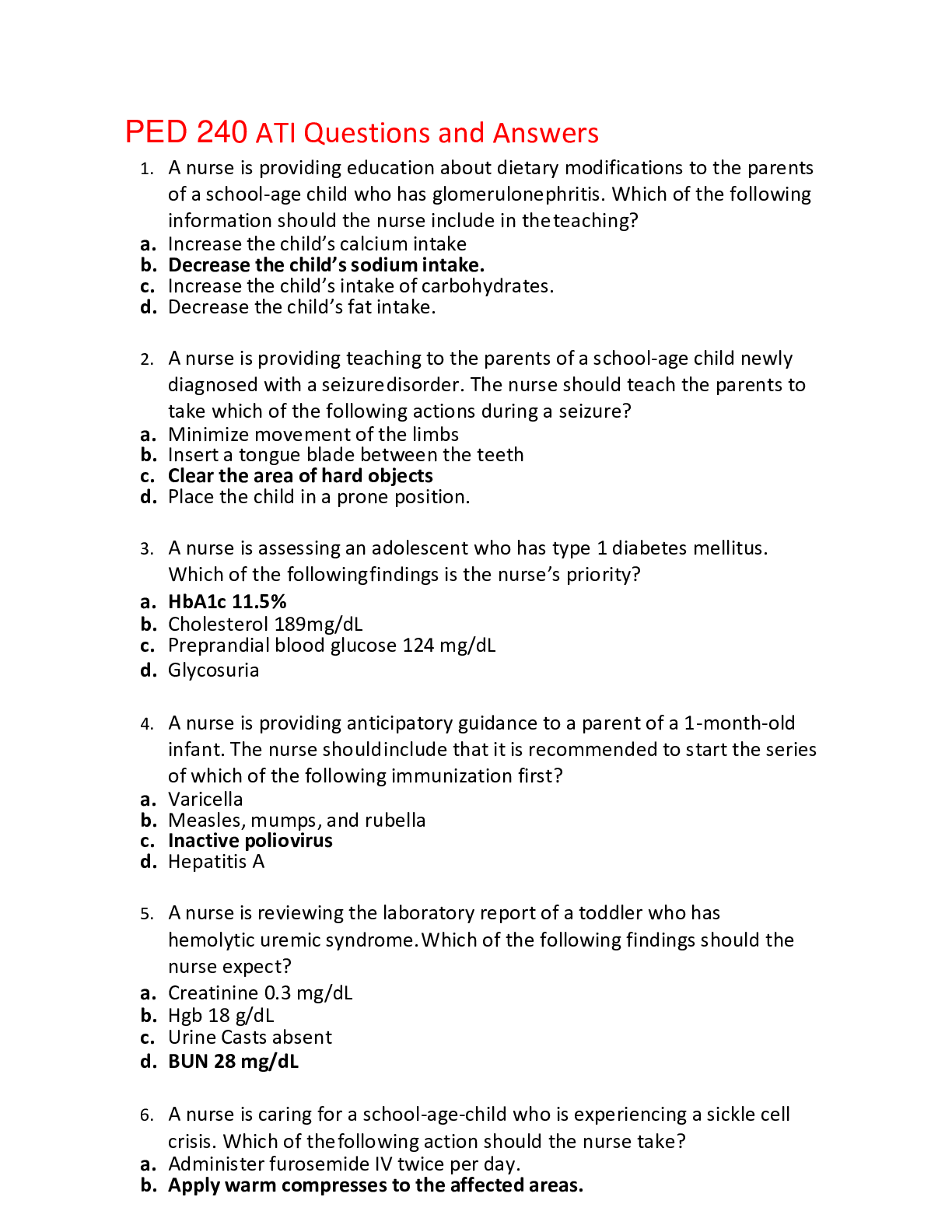
Reviews( 0 )
Document information
Connected school, study & course
About the document
Uploaded On
Oct 30, 2021
Number of pages
22
Written in
Additional information
This document has been written for:
Uploaded
Oct 30, 2021
Downloads
0
Views
181

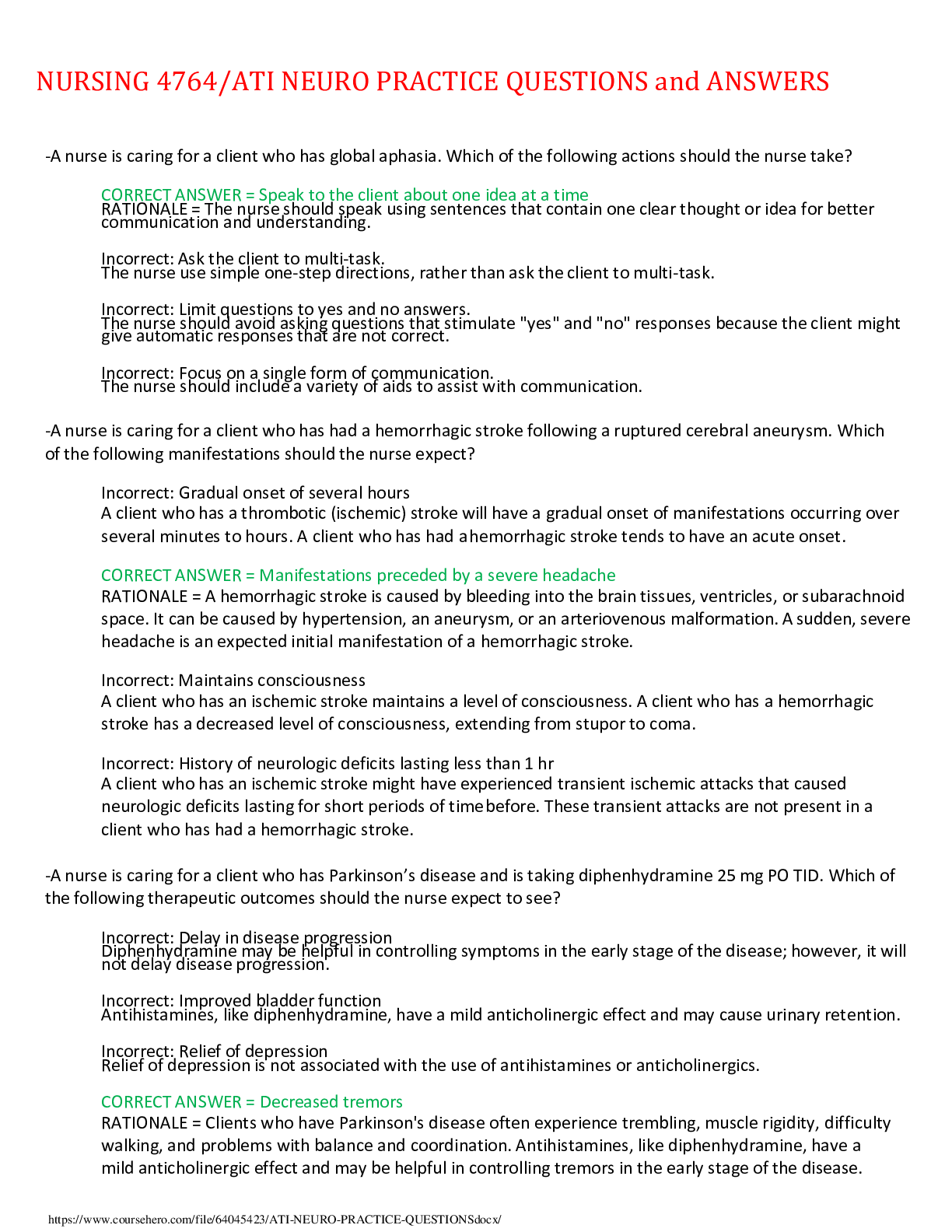
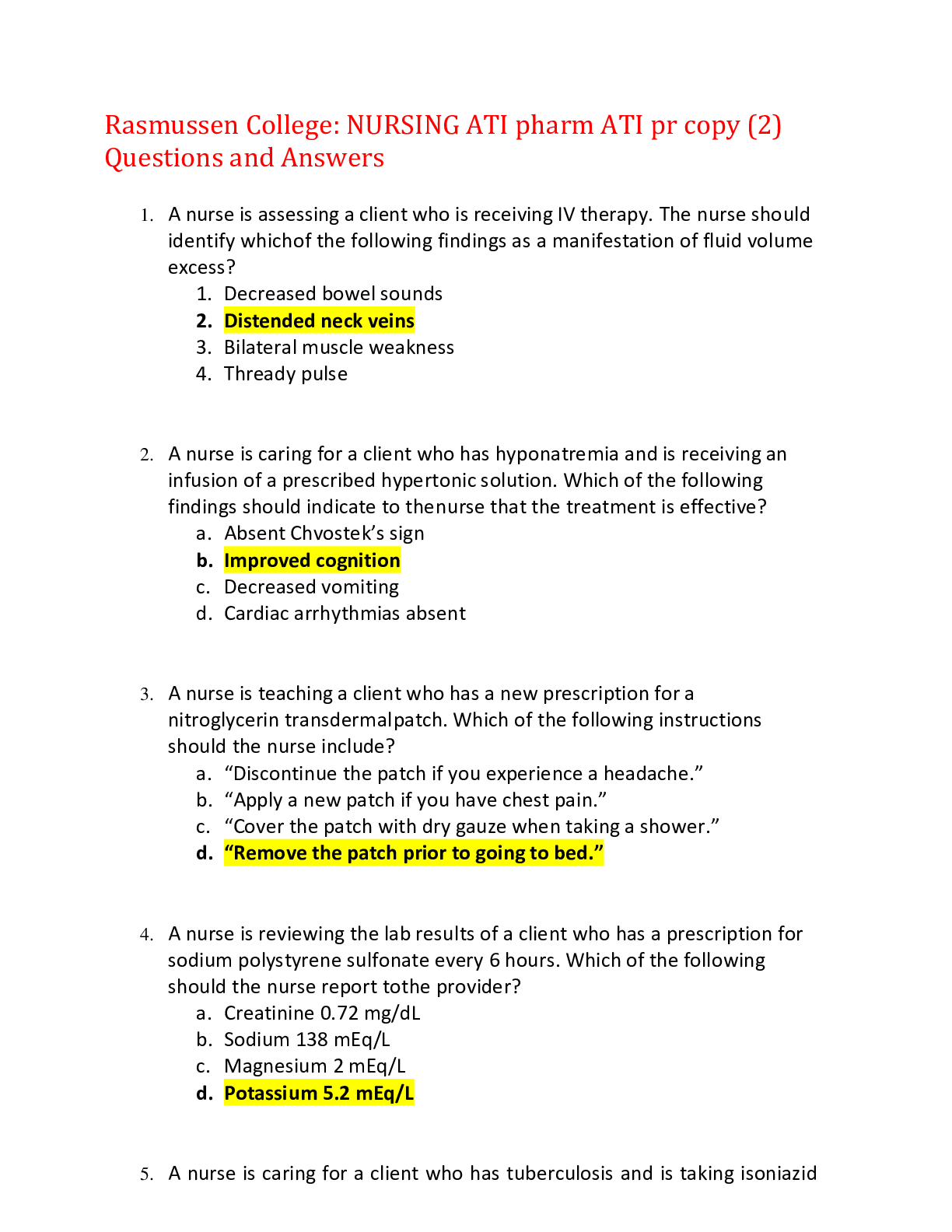
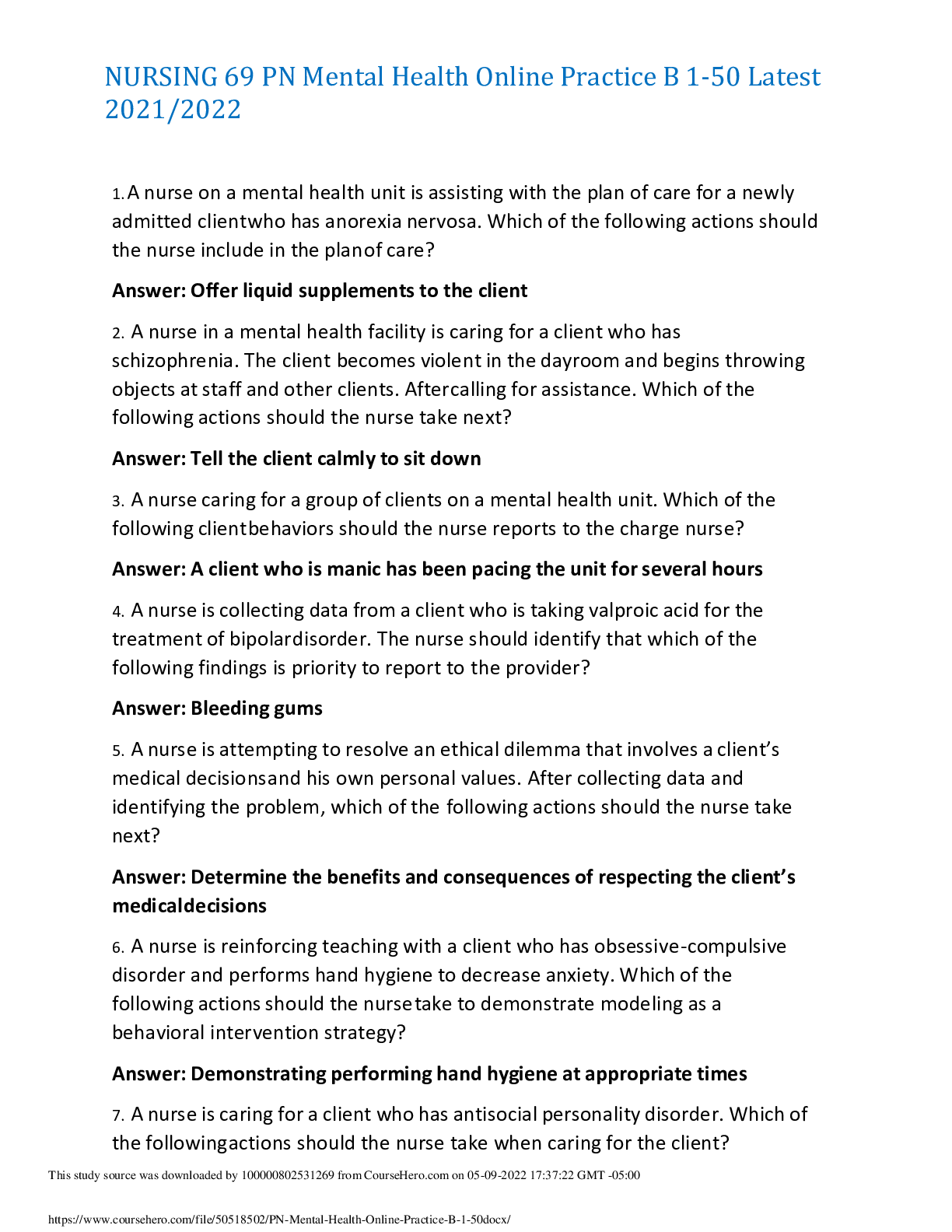
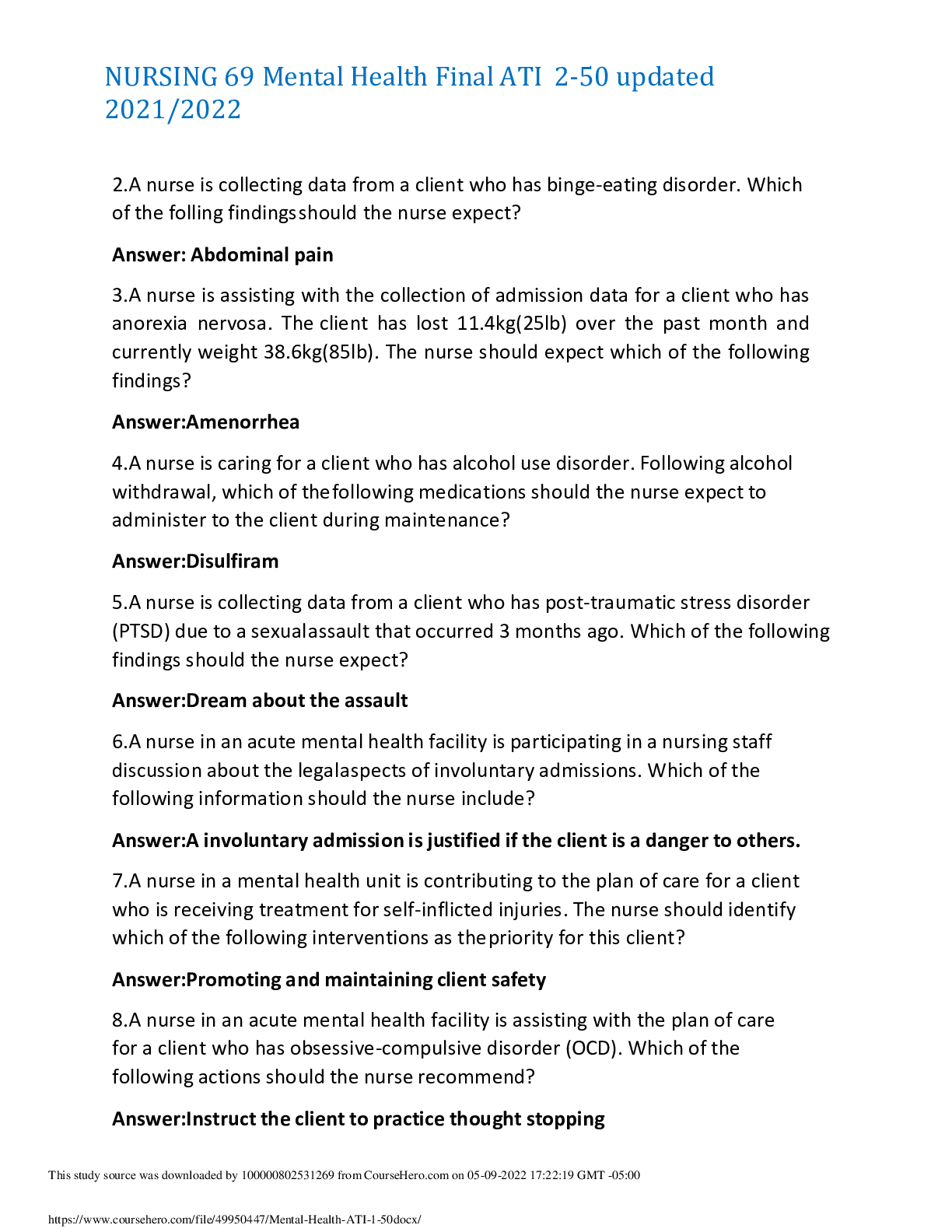
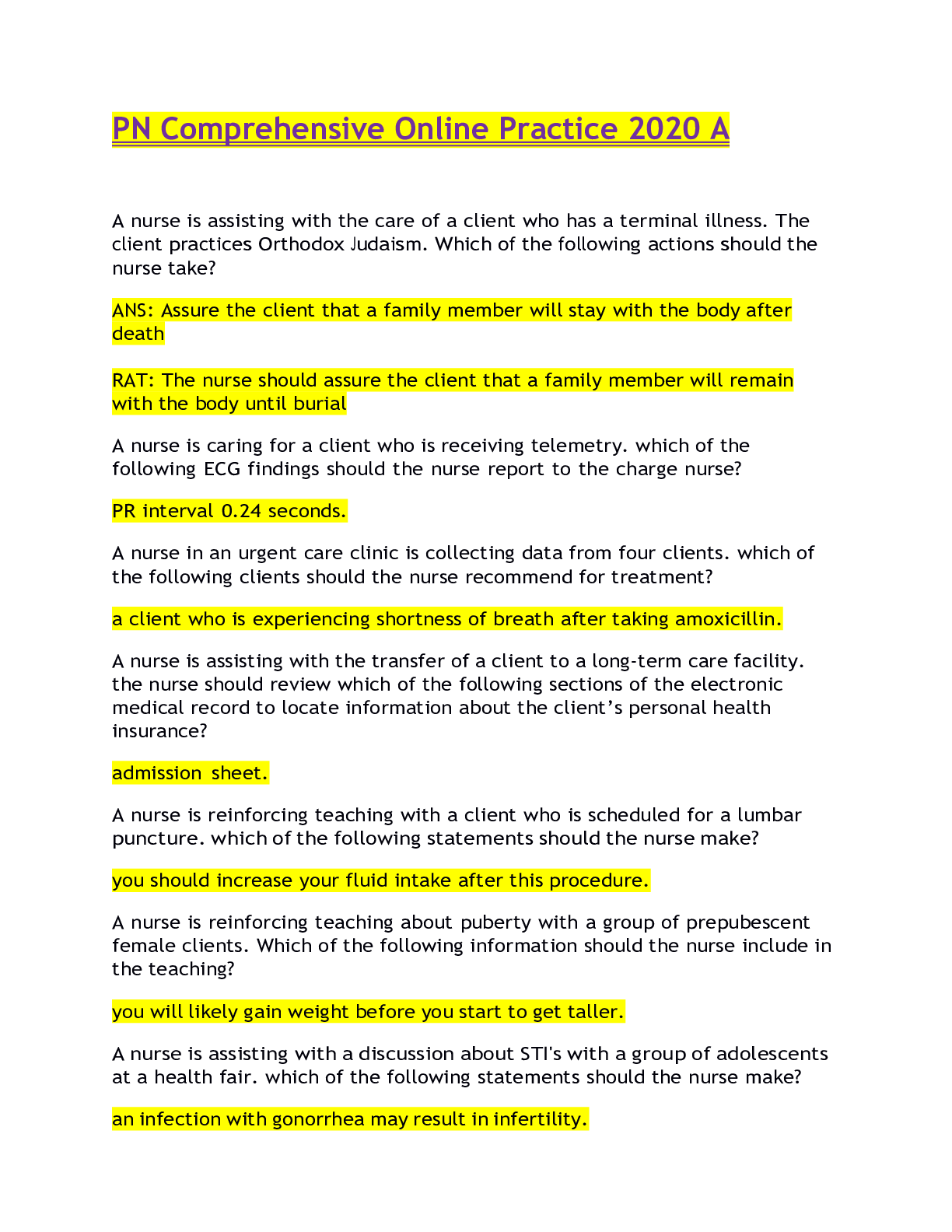
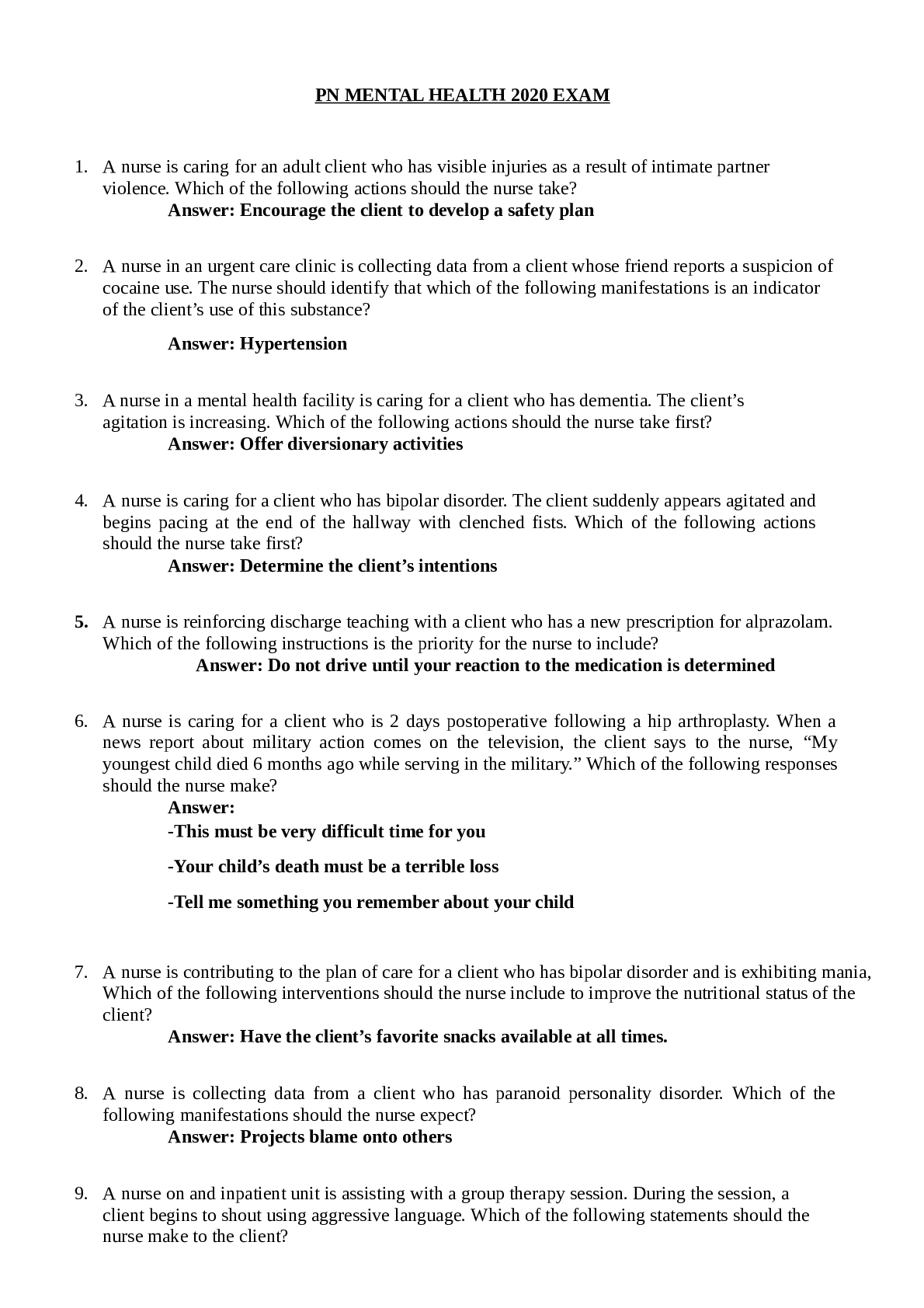

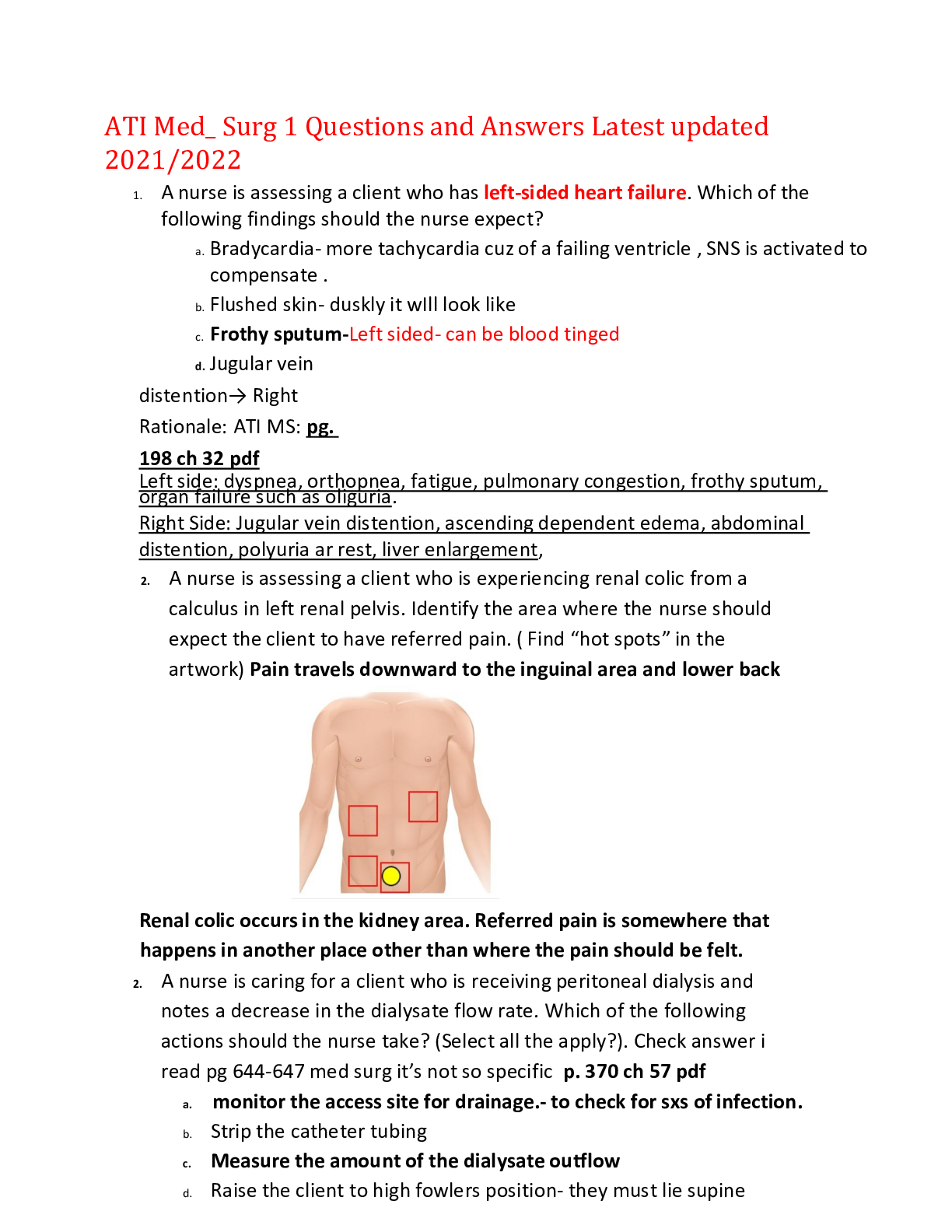
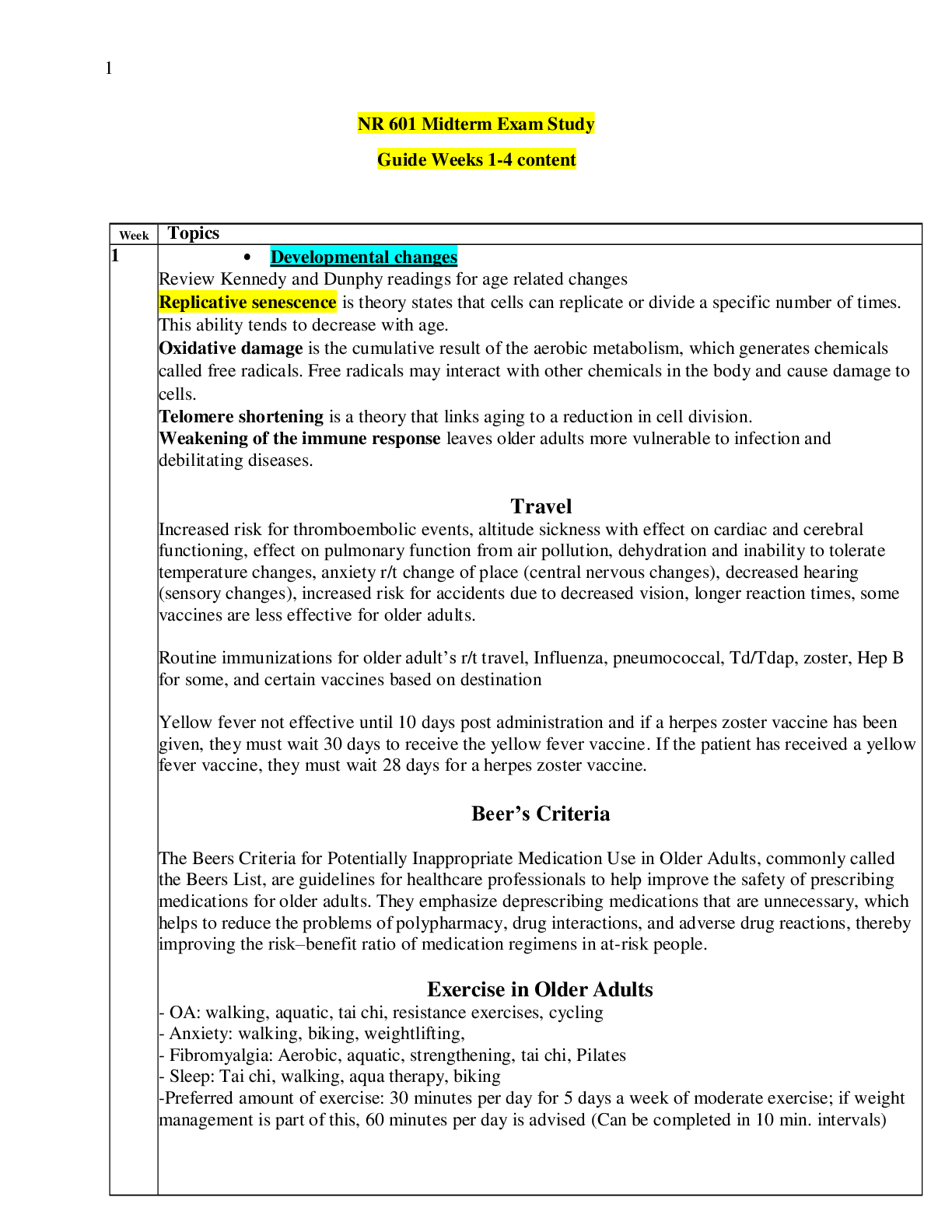
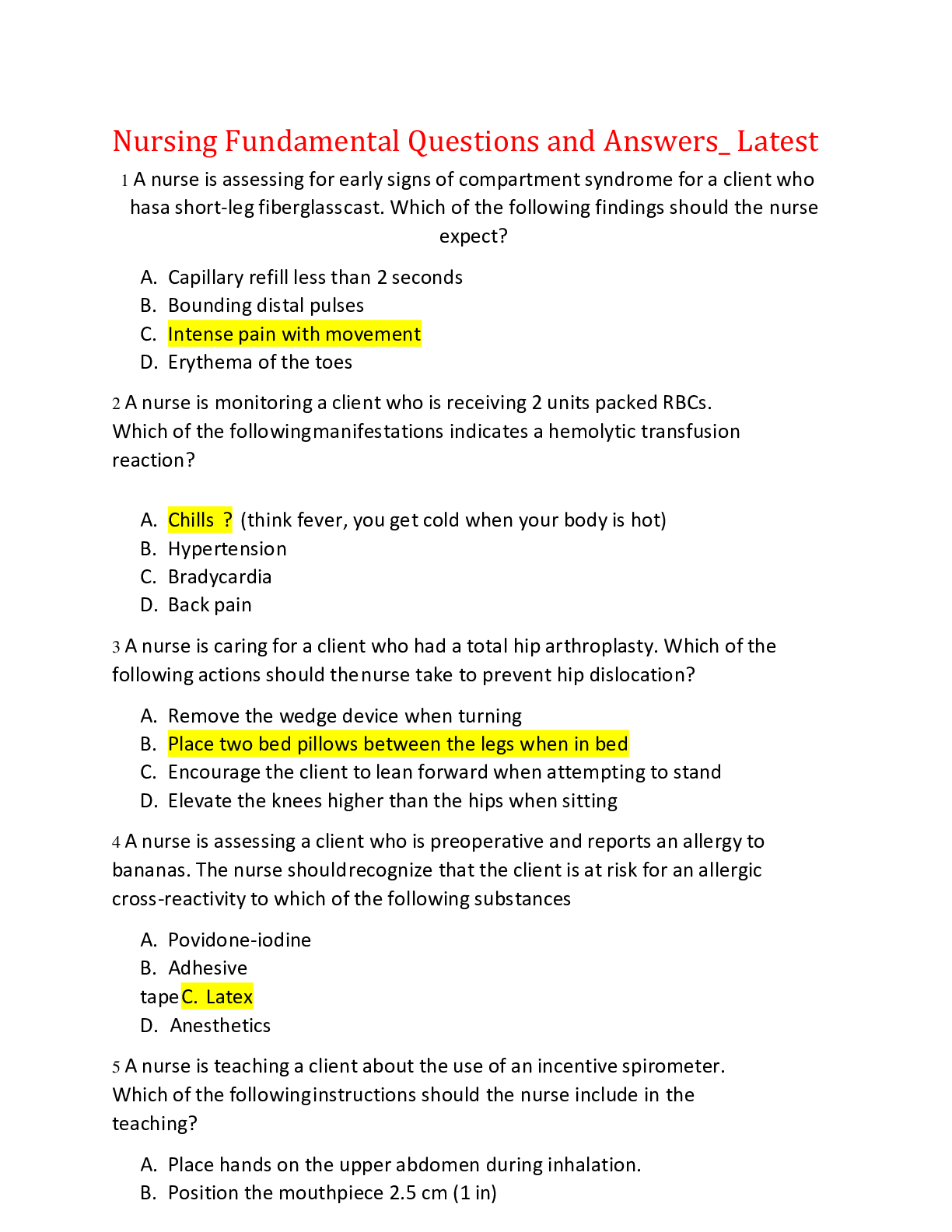
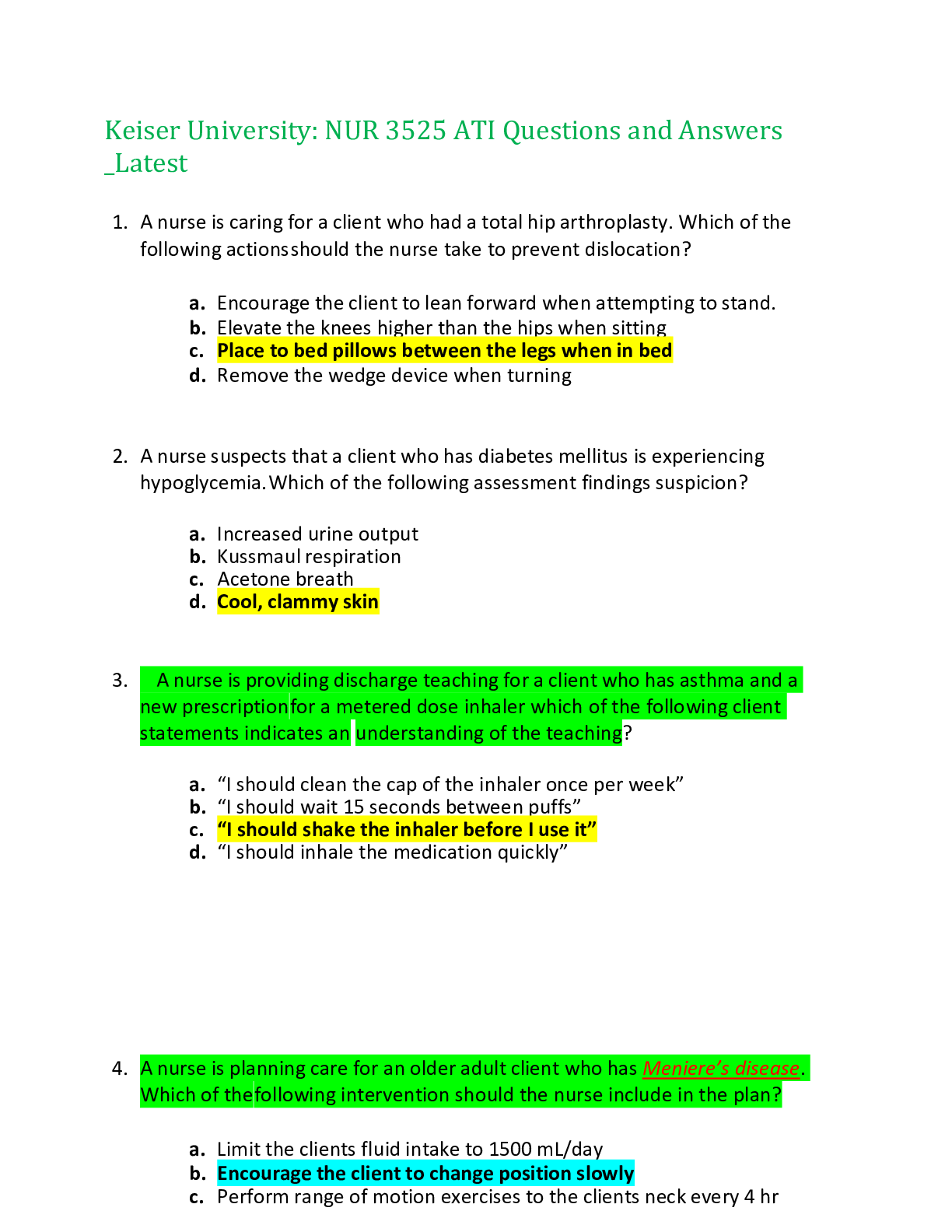

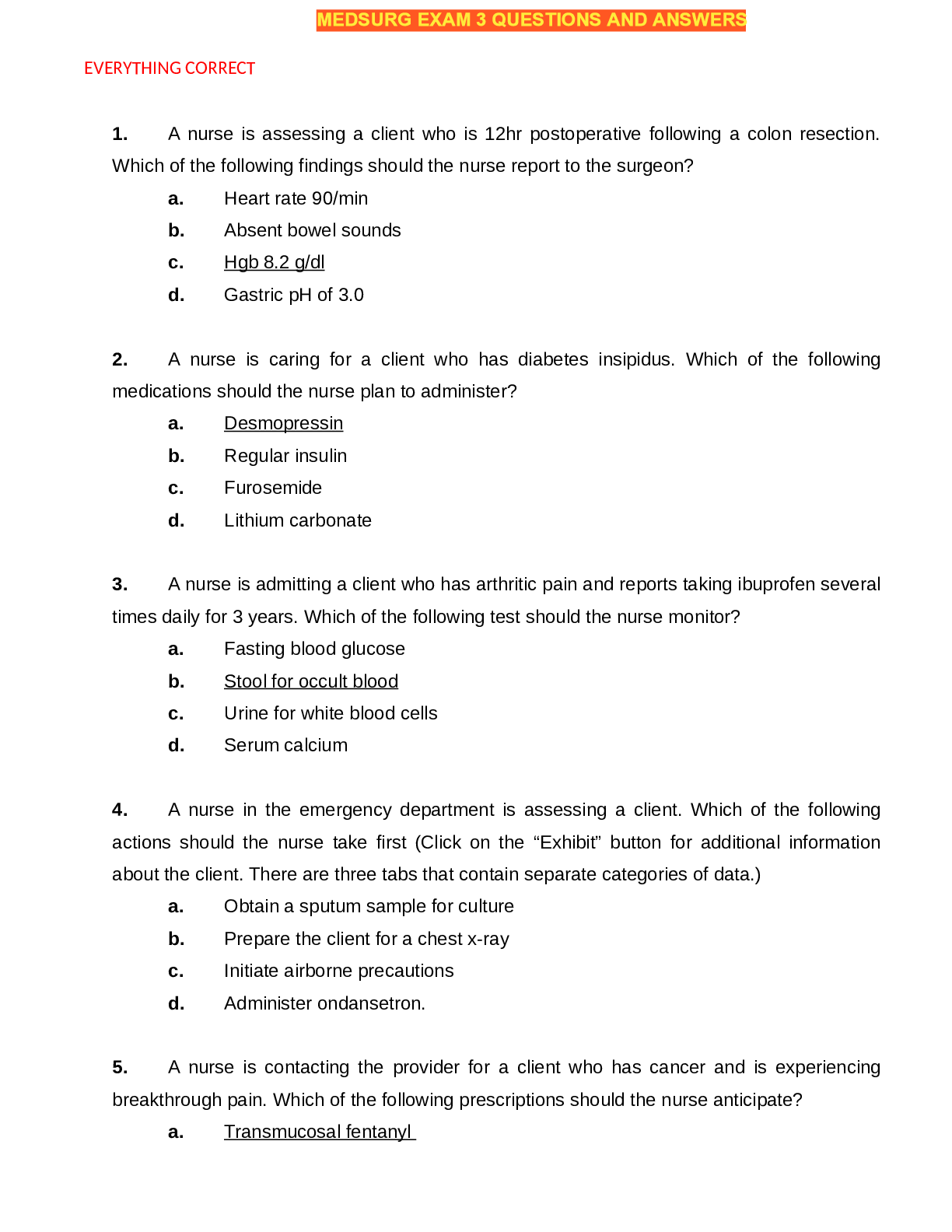
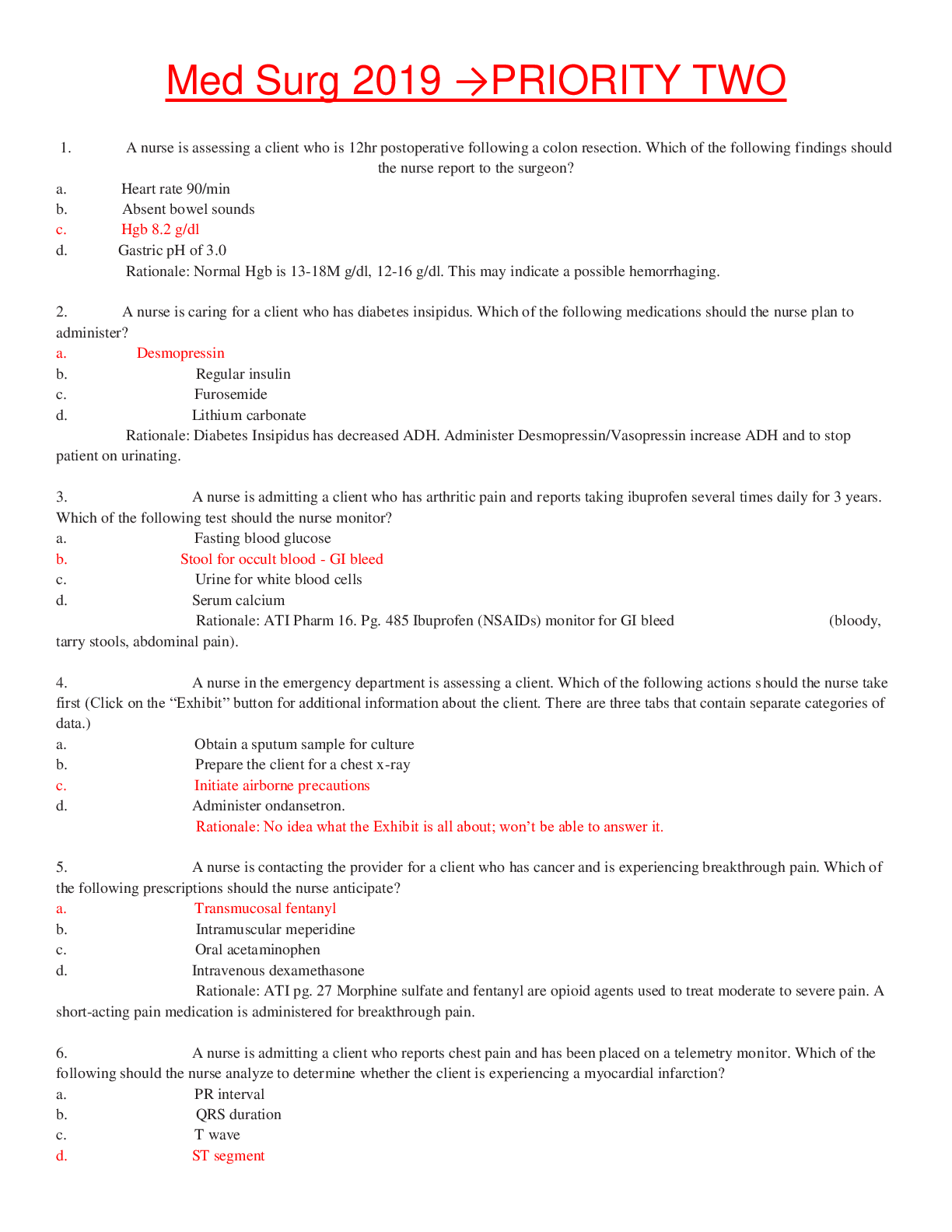
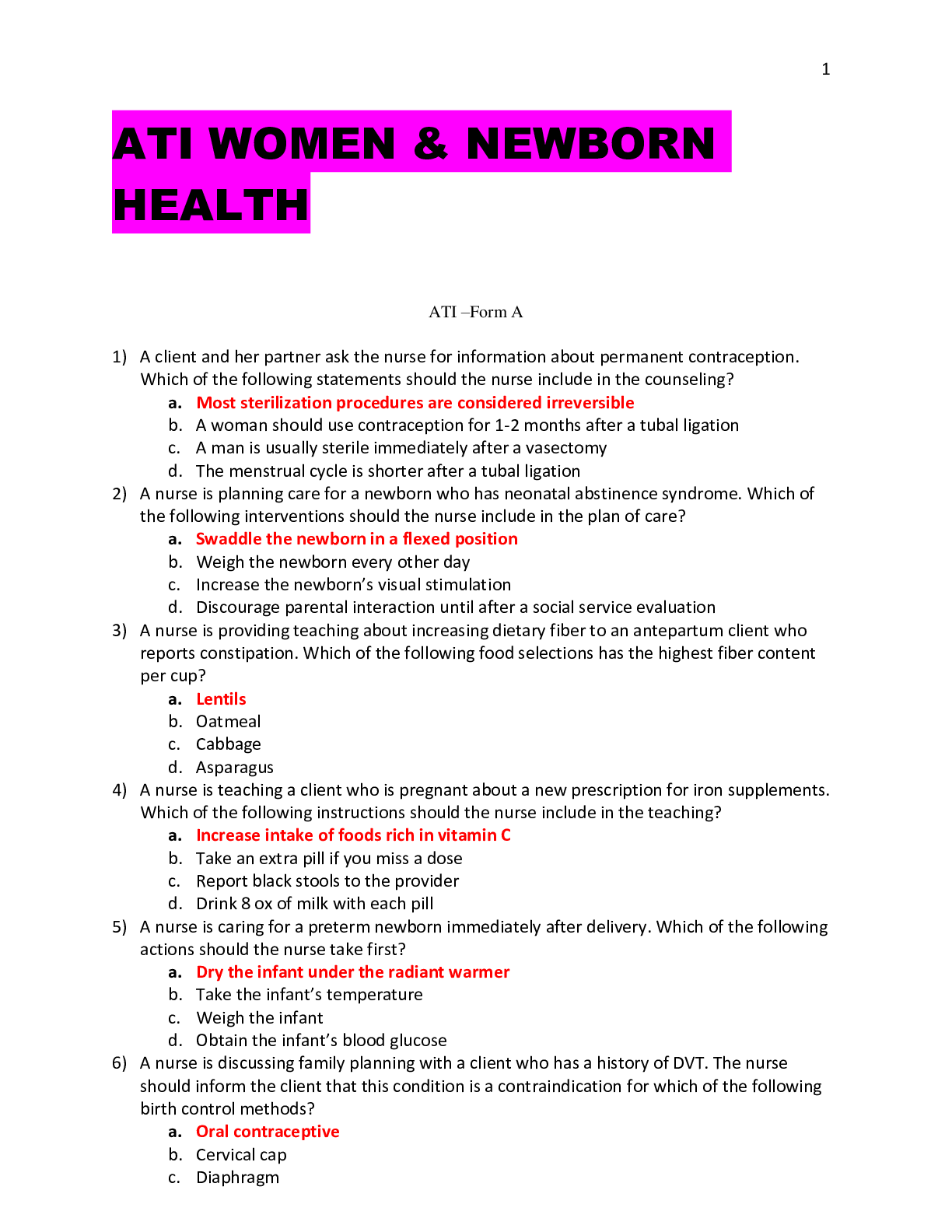
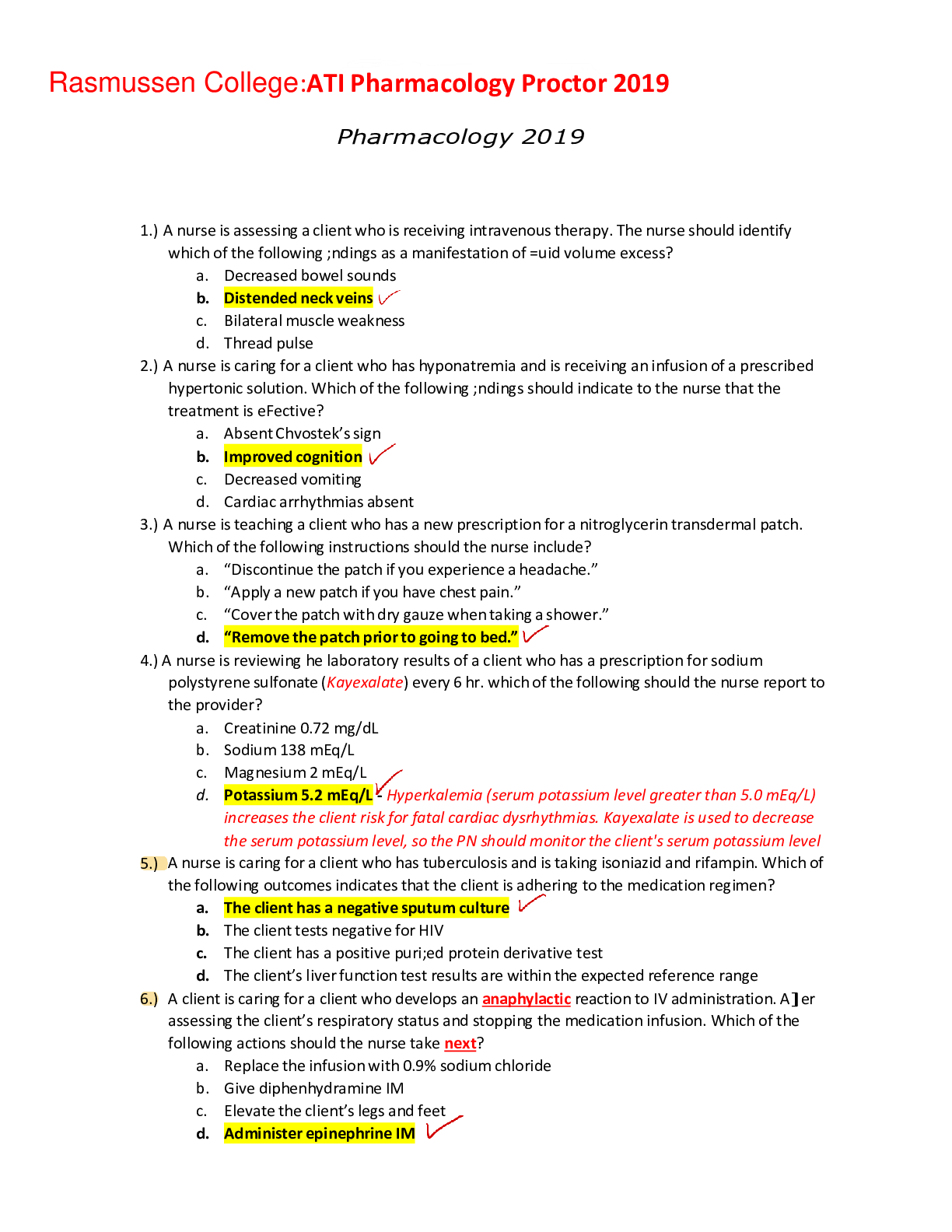

.png)
